RuralRoute

Page 18
FEBRUARY | MARCH 2023 • VOL. 29 NO. 1 | WFBF.COM
WISCONSIN FARM BUREAU FEDERATION®'S
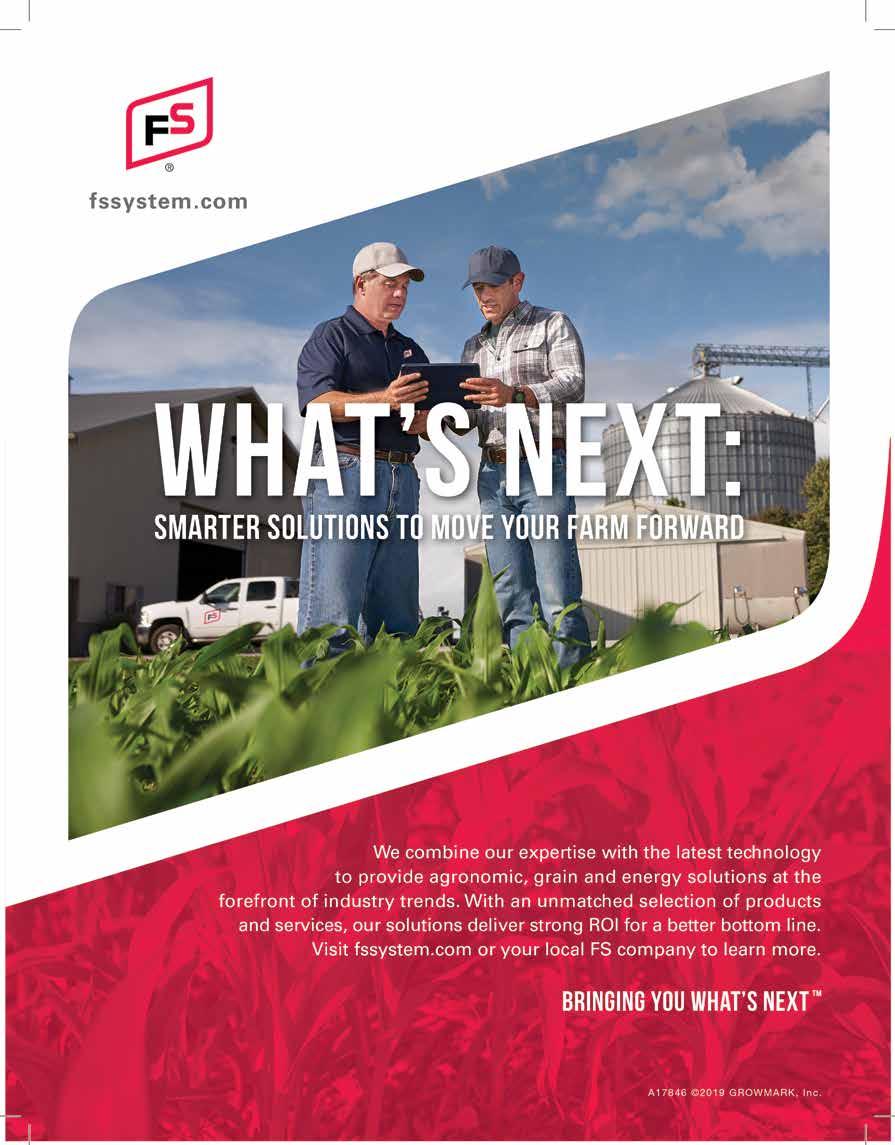
POLICY
Delegates adopted policies to guide the organization at the AFBF Convention.


AFBF CONVENTION
Scrapbook highlights from the 104th AFBF Convention in Puerto Rico.

MEET BRADLEY UKEN
Get to know WFBF’s new Chief Administrative Officer.
NEW FACES AT WFBF
Meet new staff members and interns for Wisconsin Farm Bureau.

UNMATCHED DETERMINATION
YFA Chair Savannah Brown shares how she came to her new leadership role.
AG LEAD SUMMIT
Mark your calendars for the 2023 summit, March 17-18.
MEET JENNY LEAHY
Learn more about Winnebago County member Jenny Leahy.
VOICES
Columns from Krentz, Duvall, Gerbitz, Wenzlaff and Setzer.
PICTURE THIS
Farm Bureau members share beautiful winter photos.
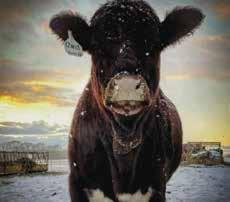
AG IN THE CLASSROOM
2022 Wisconsin Agriculture in the Classroom Outstanding Educator named.

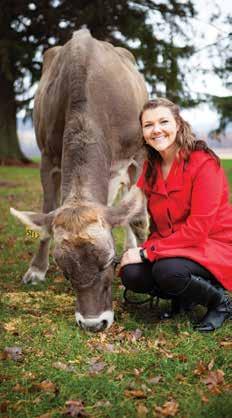
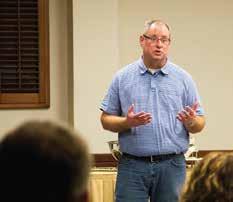
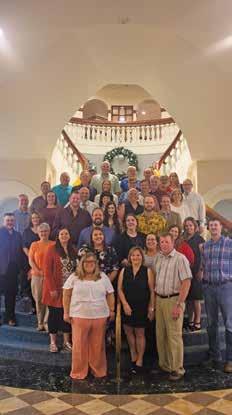

RURAL MUTUAL

Tips on inspecting your home after a winter storm and dealing with farm stress.
at wfbf.com/read.
3 wfbf.com FEBRUARY | MARCH 2023 contents vol. 29 no. 1
5 10 20 28 26 18 14 13 40 41 45
stay connected WIFarmBureau
COVER PHOTO BY CASSIE SONNENTAG
ONLINE LIBRARY
40 41 13 10 18 20 CREDIT: GLORIA
Read our previous issues
REGAN
Route GUEST EDITOR’S NOTE
The theme of this year’s AFBF Convention was “Mi Familia”, which is so fitting for how many of us as members feel about the organization. Whether you are a thirdgeneration member or the first to join, Farm Bureau provides a community for agriculturists of all ages.
Wisconsin was well-represented at this year’s AFBF Convention that took place in San Juan, Puerto Rico, in January. Catch up on WFBF’s representation at the AFBF Convention beginning on page 5.

Editor
Amy Eckelberg - 608.828.5706
Designer
Lynn Siekmann - 608.828.5707
Contributors
Cassie Sonnentag - 608.828.5711 Marian Viney
Address of Publication
Wisconsin Farm Bureau Federation PO Box 5550
Writer Harper Lee infamously said, “You can choose your friends, but not your family.” As a Farm Bureau member, I would challenge this statement.
I grew up in a Farm Bureau family; while my parents were not always active within Jackson County Farm Bureau, I remember reading Rural Route when it hit our mailbox, being a participant in FFA Farm Forum and having a positive image of the organization’s prominence in Wisconsin agriculture.
As the daughter of a former dairy farmer, agriculture has always been a part of my life. My parents farmed for much of my early life, which inevitably impacted my future career direction.
Family is more than your blood relatives, however.
As beginning farmers ourselves, my husband and I lean heavily on the experiences of the farmers around us. Through experiences like annual meetings, county activities and statewide events, we have collectively built a network of Farm Bureau family members who provide us with advice, resources and experiences that continue to benefit our farm transition.
Without the support of our families and Farm Bureau family, alike, we would not be where we are today.
You’ll meet several additions to the Farm Bureau staff, including Chief Administrative Officer Bradley Uken, Executive Director of Governmental Relations Jason Mugnaini, Director of Young Leader Programs Melissa (Doyle) Jacobson and three interns. Get acquainted with WFBF’s new staff members beginning on page 14.
In this issue, you will also meet Savannah Brown, a Jackson County Farm Bureau member, and this year’s WFBF Young Farmer and Agriculturist Chair. Savannah may not have grown up on a farm, but a long line of mentors, friends and family have led her to a career in agriculture. Read her story starting on page 18. You certainly can choose your friends, but when those friends become family, those form some special bonds. Farm Bureau has introduced me to new places, a career I am passionate about and, most importantly, to countless Farm Bureau members who truly are “Mi Familia”. Whether this is your first issue of Rural Route or one of many, we are happy to have you as a member of our Farm Bureau family.

Thanks for reading,
Cassie Sonnentag Director of Media Relations and Outreach Wisconsin Farm Bureau Federation
1241 John Q. Hammons Dr. Madison, WI 53705-0550
Postmaster: Send address changes to Wisconsin Farm Bureau Federation PO Box 5550 Madison, WI 53705-0550
Contact Information
608.836.5575
800.261.FARM (3276) wfbf.com info@wfbf.com
WFBF Board of Directors
Kevin Krentz, Berlin (President)
Joe Bragger, Independence (Vice President)
Dave Daniels, Union Grove
Arch Morton Jr., Janesville
Robert Nigh, Viroqua
Rosie Lisowe, Chilton
Brian Preder, Weyauwega
Ryan Klussendorf, Medford
Brad Olson, Frederic
Brenda Dowiasch, Augusta (Promotion and Education Committee Chair)
Savannah Brown, Black River Falls (YFA Committee Chair)
Wisconsin Farm Bureau Federation’s Rural Route (ISSN 1082-1368) (USPS 39940), the official publication of the Wisconsin Farm Bureau Federation, is published six times per year in February|March, April|May, June|July, August|September, October|November and December|January. Subscription of $5 is included in Farm Bureau dues. Periodical postage is paid at Madison, Wisconsin. All rights reserved. No portion of this magazine may be reproduced in whole or part without written consent.
For advertising rates and information:
Wisconsin accounts contact Slack Attack at 608.222.7630 or barbara@slackattack.com.
National accounts contact Casey McNeal at 800.798.2691 ext. 334 or casey@iafalls.com.
For general inquiries, contact Amy Eckelberg at 608.828.5706 or aeckelberg@wfbf.com.
4 WISCONSIN FARM BUREAU FEDERATION Rural Route
Rural WISCONSIN FARM BUREAU FEDERATION’S
American Farm Bureau Establishes 2023 Policies
Delegates to the AFBF business meeting voted to modernize the farm bill by expanding baseline funding, developing more flexible disaster relief programs and extending protection to more specialty crops.

In January, farmer and rancher delegates to the American Farm Bureau Federation’s 104th Convention adopted policies to guide the organization’s work in 2023. Key topics ranged from expanding risk management programs and improving dairy pricing transparency to battling hunger.
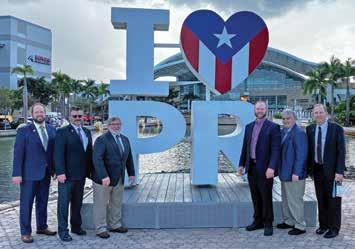
Delegates were polled regarding their farms at the beginning of the voting session. The results show almost 99% (334 delegates) of those who cast votes operate family farms and almost 65% represent small- to mid-size farms as defined by USDA.
“Delegates demonstrated the strength of Farm Bureau by coming together to represent hard-working farm families from all 50 states and Puerto Rico,” said AFBF President Zippy Duvall. “There’s a lot of work to do in 2023 as Congress drafts the next farm bill, and the policies set forth today will guide AFBF as we work to ensure farmers and ranchers can continue to meet the growing needs of families in America and around the world.”
They also voted to bring more transparency to the federal milk pricing system. Several changes to policy include support for more USDA audits of processing costs to ensure data remains accurate, and a Federal Milk Marketing Orders voting procedure that requires cooperatives to communicate more clearly with members regarding proposed changes. The results of an FMMO forum hosted by AFBF in October served as a guidepost for policy changes.
Recognizing growing food insecurity in the U.S., delegates approved new policy to support access to nutrition programs including connecting farms directly with food banks, increasing the number of SNAP-approved food sales outlets and other efforts to make produce available to families living in food deserts.
On trade, delegates added policy for USDA to continue working with the Mexican government to drop a proposed ban on imports of biotech corn. The new policy also encourages USDA to urge the Mexican government to accept established science on the safety of U.S. biotech products.
Voting delegates also formalized Farm Bureau’s position opposing the 2022 Waters of the U.S. rule and a proposed Securities and Exchange Commission rule if it requires Scope 3 emissions reporting from farms.
5 wfbf.com FEBRUARY | MARCH 2023 AFBF
The delegate floor at the AFBF Annual Convention.
WFBF Delegates and alternates (from left:) Brian Preder, District 7; Kevin Krentz, District 5; Dave Daniels, District 1; Ryan Klussendorf, District 8; Robert Nigh, District 3; and Arch Morton Jr, District 2.
Delegates were polled regarding their farms at the beginning of the voting session. The results show almost 99% (334 delegates) of those who cast votes operate family farms and almost 65% represent small- to mid-size farms as defined by USDA.
Wisconsin Members Appointed to National Committees
Several newly appointed volunteers will provide leadership beginning in 2023 as farmer and rancher members of the American Farm Bureau Federation’s Promotion & Education and Young Farmers & Ranchers committees.
“Engaging with consumers and elected leaders to build trust while sharing agriculture’s story and advancing leadership skills
are important foundations of national program committee work,” said AFBF President Zippy Duvall. “We welcome these newly appointed Farm Bureau members.”
National committee members are nominated by their respective state Farm Bureaus.
AFBF PROMOTION & EDUCATION COMMITTEE – LYNN LEAHY
Waushara County Farm Bureau member
Lynn Leahy has been appointed to AFBF’s Promotion & Education committee for a two-year term. Lynn is a research agronomist at Heartland Farms, Inc., a 9,000-acre farm growing potatoes for potato chips. She grew up on an 80-cow dairy farm in Argyle. Lynn holds a bachelor’s degree in

dairy science and a master’s degree in horticulture, both from UW-Madison. She has served as the Waushara County YFA chair and is president of the Tri-County FFA Alumni. Lynn was a member of Farm Bureau Institute Class VIII. She is active in her community as a curling club and city band member and Meals on Wheels board member. Lynn and her husband, Mike, reside in Plover.
Ten individuals representing qualifying Farm Bureau Promotion & Education states make up the committee. Its mission is to develop and centralize resources that inspire and equip Farm Bureau to convey the significance of agriculture.
In addition to Lynn, President Duvall also announced the appointment of the following members to the Promotion & Education Committee to two-year terms starting in April: Heidi Cooper, Massachusetts; Julie Stephenson, Michigan; and Nate Schlief, North Dakota. Alan Clark, Idaho was reappointed for a two-year term.
AFBF YOUNG FARMERS & RANCHERS COMMITTEE – BEN AND HAILY SAND

Dunn County Farm Bureau members Ben and Haily Sand have been appointed to AFBF’s Young Farmers & Ranchers committee for a two-year term. Ben and Haily farm as Sand Grains LLC south of Menomonie, along with their daughters Ryelin (3) and Ryverly (10 months). On the farm, the couple grows corn, soybeans and rye. They also have a large garden where they grow sweet corn, pumpkins, squash and apples to sell for their kid’s education. Ben serves as the Dunn County Farm Bureau President and the couple is serving as ex-officio members on the WFBF YFA Committee.
In addition to their work on the farm, the couple holds off-farm jobs. Ben works for 715 Ag Supply as a Pioneer sales associate and agronomist. He also owns 715 Risk Advisors, which offers all your cropping needs from soil sampling and crop and fertilizer planning to crop insurance. Haily is the Assistant Team Manager for AgSource Laboratories where she serves as an independent agronomist, advising farmers on optimizing their farms fertilizer needs, improving yields, all while saving on bottom line costs.
The YF&R Committee is made up of 16 positions representing all regions of the U.S. An individual or couple may hold each committee appointment. Committee members are responsible for program planning, which includes the
coordination of YF&R competitive events during AFBF’s convention each January, and the Harvest for All program.
In addition to the Sands, Duvall also announced the appointment of the following members to the YF&R Committee for the 2023-2025 term beginning in February: Kevin Lussier, Florida (beef cattle, dairy cattle and cheese production); Kaylee Heap, Illinois (pumpkins, squash, gourds, flowers, mums, soybeans and corn); Joe and Katelyn Packard, Michigan (dairy cattle, corn, alfalfa, wheat and forage crops); Jason and Caitlin Keck, Minnesota (beef cattle, hay, corn, soybeans and produce); Andrew and Clarissa Cauthorn, Missouri (corn, soybeans, wheat, alfalfa and beef cattle); Sofia Lilly, North Carolina (wine grapes, blueberries and figs); and Jonathan and Alyssa Zucker, Ohio (corn and soybeans).
6 WISCONSIN FARM BUREAU FEDERATION Rural Route AFBF
Door County YFA Member Competes Nationally

Rachel Harmann from Door County advanced to the Sweet 16 Round of American Farm Bureau’s Young Farmers and Ranchers Discussion Meet.
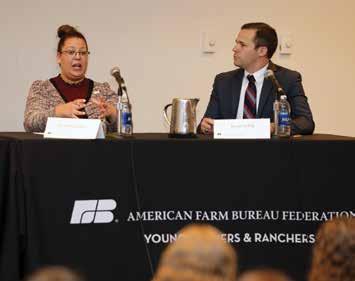

The Discussion Meet is a panel discussion in which Farm Bureau members between the ages of 18 and 35 are judged on their ability to express their ideas and opinions and reach a solution on current issues affecting agriculture.
She is a volunteer engagement representative for the American Red Cross. Harmann, her husband and sons raise and show registered beef cattle.
Harmann serves as Door County Farm Bureau’s vice president and local affairs chair. She is participating in AFBF’s Partners in Advocacy Leadership program; was an Alice in Dairyland finalist; Master of Beef Advocacy graduate; Wisconsin Beef Ambassador; and graduated of WFBF’s Leadership Institute Class XIV.
2023 Policy Book Available Online
Want to know where Wisconsin Farm Bureau Federation stands on an issue?
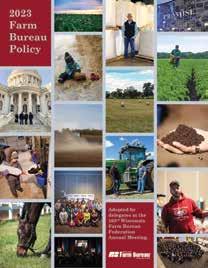
The 2023 policy book is available at wfbf.com.
The document reflects the most recent policy directives established by voting delegates at the 103rd WFBF Annual Meeting in December.
“Farm Bureau’s policy is established by members through a structured policy development process,” said WFBF President Kevin Krentz. “It makes me proud that suggestions and policy ideas come directly from members at the county level. Through this grassroots process Farm Bureau can work to represent its members’ needs. I encourage you to review our policy book and get involved in the process of policy development.”
To view the policy book online, visit wfbf.com/policy/policy-development.
7 wfbf.com FEBRUARY | MARCH 2023
2022 YFA Discussion Meet final four contestants (from left:) Erin O’Toole, Sarah Hetke, Rachel Harmann and Kallie Coates.
Harmann competing in the Sweet 16 round during the YFA Discussion Meet in Puerto Rico.
Wisconsin Border Collie Named Finalist in Farm Dog of the Year Contest
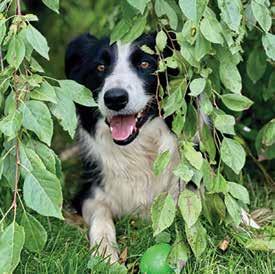
Everyone on the family farm pitches in and does their part, including four-legged friends, prompting Farm Bureau to launch the Farm Dog of the Year contest five years ago – now a popular feature of the American Farm Bureau Federation’s Convention. The winner of the 2023 Farm Bureau Farm Dog of the Year award is Tough, a Border Collie owned by Kansas Farm Bureau members Denny and Donna Ashcraft. AFBF, with support from Nestlé Purina PetCare, recognized Tough, four regional runners-up and a People’s Choice Pup on Jan. 8.
Among the top dogs recognized for the honor was Bree, a Border Collie owned by Wisconsin Farm Bureau members Ed and Elizabeth Nowbielski from Clark County. Other finalists included: Stan, owned by Lexie Hain, New York Farm Bureau member; Pepper, owned by Tom and Stephanie Barnett, Tennessee Farm Bureau members; and Fez, owned by Alexa Coniglione, Montana Farm Bureau member.
The contest celebrates farm dogs that work alongside farmers and ranchers as they sustainably produce nutritious food for families and their pets across America. Rounding up livestock and chasing off predators are among the many tasks performed by farm dogs.
“We’re very excited to partner with Purina for the fifth annual Farm Dog of the Year contest, providing the public a look into daily life on the farm,” said AFBF President Zippy Duvall. “Farmers and ranchers love what they do, but it can be stressful, even on the best days. Because farm dogs often play a dual role as both working dogs and companions to farm families, they can help ease the burden.”
Purina donated prizes for the contest again this year. This included $5,000 in prize money, a trophy plate, a year’s supply of Pro-Plan dog food and other Purina products for Tough. The four runners-up in the contest will each also receive $1,000 in prize money, a trophy plate and Purina products.
Learn more and nominate your dog for the 2024 contest at fb.org/farmdog.
PEOPLE’S CHOICE PUP

Case, owned by Louisiana Farm Bureau members Kelsi and Amanda Duhon, was named People’s Choice Pup in a social media contest with online voting as part of the overall competition. Case wins bragging rights, a year’s supply of Pro-Plan dog food and other Purina products.
Four other dogs were contenders for People’s Choice Pup: Bernice, owned by Illinois Farm Bureau members John and Sandy Brix; Sage, owned by New York Farm Bureau member Denise Andrews; Zora, owned by Wyoming Farm Bureau member Andrea Parish; and Hasty, owned by Arizona Farm Bureau members Ben and Ashley Menges.

8 WISCONSIN FARM
FEDERATION Rural
BUREAU
Route
AFBF CREDIT: DUHON FAMILY PHOTO
CREDIT: EMILY NOWOBIELSKI




9 wfbf.com FEBRUARY | MARCH 2023
Scrapbook
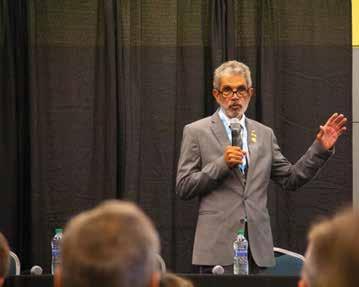



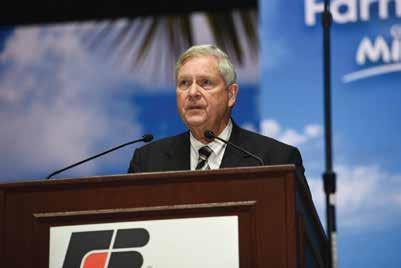
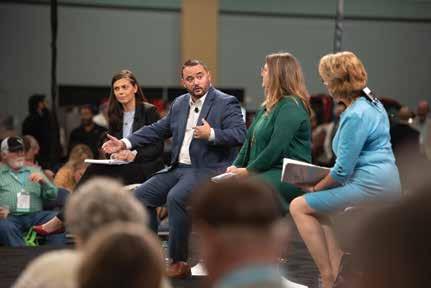
10 Rural Route
Puerto Rico Farm Bureau President Héctor Iván Cordero
United States Secretary of Agriculture Tom Vilsack
Breaking through the Chaos in Washington session.
AFBF President Zippy Duvall
Sunday afternoon keynote, Big Kenny Alphin







11 wfbf.com FEBRUARY | MARCH 2023
Coffee fields at Hacienda Muñoz
San Juan Artisan Distillers and sugarcane plantation.
WFBF President Krentz waved the state flag in the opening ceremonies.
Wisconsin Leopold Conservation Award Seeks Nominees
Know a Wisconsin farmer or forestland owner who goes above and beyond in the care and management of natural resources? Nominate them for the 2023 Wisconsin Leopold Conservation Award®.

Sand County Foundation and national sponsor, American Farmland Trust, present the Leopold Conservation Award to private landowners in 25 states for extraordinary achievement in voluntary conservation. In Wisconsin the $10,000 award is presented annually with Wisconsin Farm Bureau Federation and Dairy Farmers of Wisconsin.
Given in honor of renowned conservationist Aldo Leopold, the award recognizes landowners who inspire others with their dedication to land, water and wildlife habitat management on private, working land. In his influential 1949 book, “A Sand County Almanac,” Leopold called for an ethical relationship between people and the land they own and manage.
Nominations may be submitted on behalf of a landowner, or landowners may nominate themselves. The application can be found at sandcountyfoundation.org/ApplyLCA.
The application deadline date is Aug. 1. Applications must be emailed to award@sandcountyfoundation.org.
Applications are reviewed by an independent panel of agricultural and conservation leaders.
“A commitment to conservation is truly worth recognizing
and celebrating,” said WFBF President Kevin Krentz. “I encourage farmers to apply or nominate someone who deserves this special recognition for their continued conservation efforts.”
“Recipients of this award are examples of how Aldo Leopold’s land ethic is alive and well today. Their dedication to conservation shows how individuals can improve the health of the land while producing food and fiber,” said Kevin McAleese, Sand County Foundation President and CEO.
The Leopold Conservation Award Program in Wisconsin is made possible thanks to the generous support of American Farmland Trust, Dairy Farmers of Wisconsin, Wisconsin Farm Bureau Federation, Sand County Foundation, Culver’s, Compeer Financial, McDonald’s, The Nature Conservancy, USDA Natural Resources Conservation Service, We Energies Foundation, Wisconsin Corn Growers Association, Wisconsin Corn Promotion Board, Wisconsin Land and Water Conservation Association, Wisconsin Potato and Vegetable Growers Association, and Wisconsin Soybean Marketing Board.
The Leopold Conservation Award will be presented at the WFBF Annual Meeting in December.
The first Wisconsin Leopold Conservation Award recipient was selected in 2006. Joe and Christy Tomandl of Medford received the award in 2022.

12 WISCONSIN FARM BUREAU FEDERATION Rural Route ISSUES
Joe and Christy Tomandl
Bradley Uken has been selected as Wisconsin Farm Bureau Federation’s Chief Administrative Officer. Uken will oversee all day-to-day operations and staff for WFBF.

Uken spent his entire career working for Illinois Farm Bureau. During this time, he has served members in three counties including Stark, Bureau and Champaign.
“Farm Bureau is a great organization, one that continuously strives to serve our members,” said Uken. “I am very fortunate to have the opportunity to be part of Wisconsin Farm Bureau. I look forward to helping the organization build on its rich tradition and meeting the challenges that agriculture faces now and in the future.”
Tell us about your family.
I have been married to my wife Christine for 22 years. Christine works as a paraprofessional in the Mahomet-Seymour school district. We have three children: Nicholas, a junior at Southern Illinois University; Tyler, a freshman at the University of Sioux Falls; and Jill, a senior at Mahomet-Seymour High School. Tyler plays football at USF and Jill plans to attend Parkland College majoring in diesel technology. Nicholas is a member of the Illinois National Guard and Army ROTC.

What is your connection to and background in agriculture?
I grew up on a corn, soybean and wheat farm. We also had a small farrow to finish hog farm. My family continues to farm today, minus the hogs. I still help around the farm when I can, especially during planting and harvest season.
What is your favorite food or meal?
A bowl of homemade chili with crackers and corn bread.
What is your favorite season or time of the year?
Fall: you have harvest, football and opportunities for a backyard campfire with friends nearly every weekend.
Who inspires you?
Lin Warfel, one of our members in Champaign County. Lin has been very active within Farm Bureau serving as president of Champaign County a few years ago. Lin has helped me in so many ways, more than just volunteering at events. He has encouraged me to make sure we are looking at both sides of an issue, that we are continuing to build coalitions with various groups and studied Farm Bureau policy with me on numerous issues. Additionally, his understanding of board governance and long-term thinking is phenomenal. He’s an ideal leader for any organization he is part of.
What is the best piece of advice you have ever received?
Think big and do good.
What is your favorite Wisconsin agriculture product?
Cheese – especially when it is melted on a piece of pizza.
If you could have dinner with anyone, who would it be and why?
Doris Kearns Goodwin. She is, by far, my favorite author.
What motivates you on challenging days?
The confidence in the team around me to help work through daily challenges.
What is your favorite sports team?
I am a lifelong fan of the St. Louis Cardinals.
What is something people would not know about you?
I rappelled a 12-story building helping our county Farm Bureau Foundation raise money for scholarships and Ag in The Classroom efforts. While it was a lot of fun, I’m not looking for more opportunities or buildings to rappel from!
What is your favorite Farm Bureau moment or memory?
A couple of years ago, our county Farm Bureau was awarded the President’s Award and Liberty Bell Award from the Illinois Farm Bureau. The awards recognize the volunteer efforts and programs of the county Farm Bureau. The President’s Award recognizes overall programming efforts while the Liberty Bell focuses on local affairs and legislative efforts.
Why are you proud to be a Farm Bureau member?
The true grassroots nature of our organization; the voice of our members truly drives the actions of the organization.
What is your vision for the future of WFBF?
First, to continue to be the trusted and reliable voice for agriculture in Wisconsin. Second, to grow our membership to include more of the great diversity of agriculture in the state. Finally, build on the rich tradition of the Wisconsin Farm Bureau by providing our members with information critical to their farms, educating current and future consumers about agriculture, and advocating for our members locally, in the State Capitol and nationally.
13 wfbf.com FEBRUARY | MARCH 2023
Farm Bureau Welcomes New Staff Members
Baerwolf, Goplin, Strey Named Farm Bureau Interns
Faith Baerwolf, Kendra Goplin and Heidi Strey have been selected to intern with the Wisconsin Farm Bureau Federation during the coming year. Together they will assist in promoting and communicating for WFBF programs throughout the spring and summer of 2023.
“Internships provide valuable learning opportunities for future leaders in agriculture,” said WFBF President Kevin Krentz. “Faith, Kendra and Heidi are talented young leaders that will be tremendous assets to the Farm Bureau team throughout the coming year.”
Faith Baerwolf has been selected as the organization’s Agriculture in the Classroom intern. Baerwolf was raised on a dairy farm in Columbus, Wis. and is currently a freshman at UWMadison studying agricultural and applied economics, and life sciences communication. She is a member of the Association of Women in Agriculture, Badger Dairy Club and Collegiate Farm Bureau at UW-Madison.
During her internship, Baerwolf will collaborate on social media content creation and analysis for Wisconsin Ag in the Classroom. She will assist with communicating Ag in the Classroom programming efforts and provide program event coverage throughout the spring. Baerwolf began her duties on Jan. 17.
Kendra Goplin has been selected as the organization’s Leadership and Programs intern. Goplin grew up in Trempealeau County on her family’s cash crop farm and

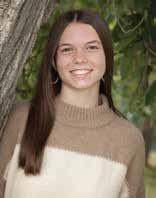

Jacobson Named Director of Young Leader Programs
Melissa (Doyle) Jacobson has been named Wisconsin Farm Bureau Federation’s Director of Young Leader Programs.
Jacobson will be responsible for working with the Young Farmer and Agriculturist program. The YFA program is for members between the ages of 18 and 35 years old and offers opportunities for leadership, networking and skills development. She will also coordinate programming for the Collegiate Farm Bureau chapters and serve as the liaison between Farm Bureau and
is currently a sophomore at South Dakota State University studying agriculture education. Throughout high school, Goplin was an active member in 4-H and FFA and currently serves as the Wisconsin FFA State Reporter.

During her internship, Goplin will support the organization’s leadership development programs including Young Farmer and Agriculturists, Promotion and Education, and FFA. She will assist with social media content creation and program promotion across the state. Goplin will begin her duties on June 19.
Heidi Strey has been selected as the organization’s Communications intern. Strey was raised near Osseo on her family’s beef farm and is currently a junior at UW-River Falls studying agricultural marketing and communications. Strey has also been an active member of 4-H and FFA and currently serves as the Wisconsin FFA State Vice President.
During her internship, Strey will assist in managing the organization’s social media presence and blog. Strey began her duties on Jan. 17.
Wisconsin’s 4-H and FFA organizations.
“I am excited to step into this new role and start the next chapter in my Farm Bureau career,” said Jacobson. “Young leader programs are vital to Farm Bureau, and I look forward to growing these programs and working with our younger members as they are the future of our organization.”
Jacobson has served as WFBF’s District 3 Coordinator since 2015 working with the Farm Bureau members in Crawford, Grant, Iowa, Lafayette, Richland and Vernon counties.
“Melissa’s depth of knowledge of Farm Bureau and her motivating positive attitude make her a great choice to lead our young member programs,” said WFBF Senior Director of Member Relations Wendy Volkert.
Jacobson and her husband, Trevor, and daughter, Sophie, reside in Mineral Point near her family’s beef farm. She
14 WISCONSIN FARM BUREAU FEDERATION Rural Route ISSUES NEWS
graduated from the UW-Madison earning a bachelor’s degree in agricultural and applied economics and life sciences communication, as well as a master’s degree in life sciences communication.
Growing up, Jacobson was an active 4-H and FFA member, showing pigs, sheep and beef cattle amongst numerous other projects at the Iowa County Fair. She continues to be a 4-H
Mugnaini Hired as Executive Director of Governmental Relations
Jason Mugnaini has been hired as Wisconsin Farm Bureau Federation’s Executive Director of Governmental Relations.

Mugnaini has over a decade of legislative experience, most recently as chief of staff to State Senator Robert Cowles, serving Shawano, Outagamie, Waupaca and Brown counties. Jason has a track record of legislative success on agricultural, rural and water issues, as well as experience in government oversight and accountability, having served as clerk of the Joint Legislative Audit Committee for several years.
“I’m excited for the opportunity to join Wisconsin Farm Bureau and be a part of such a great organization,” said Mugnaini. “I am looking forward to meeting and listening to
leader and an engaged community member, serving on many local committees and leadership boards.
Prior to joining the Farm Bureau staff, Jacobson served as the 4-H Youth Development Advisor for Iowa County UWExtension and as the Outreach Coordinator for UW-Platteville Pioneer Farm.
Farm Bureau members from across Wisconsin to best serve as an advocate for agriculture and rural communities to confront the obstacles affecting farmers.”
Mugnaini will oversee WFBF’s governmental relations team, which will support Farm Bureau members in local communities and advocate for policy on the state and national levels. He looks forward to hearing from county Farm Bureau members on policy and governmental initiatives.
“Jason’s legislative experience will be a great asset to Wisconsin Farm Bureau’s membership,” said WFBF President Kevin Krentz. “I look forward to working with Jason and leaning on his knowledge, expertise and passion for policy.”
Mugnaini received a degree in political science from St. Norbert College in De Pere. He lives in Sun Prairie with his wife Julie, their two children, Amelia and Jimmy, and their dog, Vinny.
Mugnaini began his duties on Jan. 17.
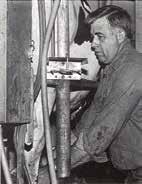
Farm Bureau Remembers Former President Haldeman

Donald R. Haldeman, 85, of rural Norwalk, passed away peacefully at the Serenity House in Tomah on Nov. 20, 2022. Don was born Dec. 22, 1936, to Howard and Lillian (Sell) Haldeman in Montfort.
“Don’s legacy runs deep, especially in Farm Bureau,” said Wisconsin Farm Bureau President Kevin Krentz.
Don was elected as president of WFBF in 1971 and served in that role for 20 years. During his time as president, Don took part in numerous trade delegations to European countries and China, representing Wisconsin agriculture on an international level.
In the fall of 1991, Don became the vice president and CEO of Rural Mutual Insurance Company. He served in this position for 14

years before retiring in 2005, at which time he returned to living fulltime on his family farm in Norwalk.
“Don’s life was dedicated to what Farm Bureau was founded on: farming and advocating for agriculture,” added Krentz. “Having served on the Wisconsin Department of Natural Resources Board, National Dairy Promotion and Research Board, American Farm Bureau Board of Directors and the Wisconsin Power & Light/Alliant Energy Board, Don’s legacy has left a tremendous impact on agriculture both here in Wisconsin and across the country.”
Wisconsin Farm Bureau extends its deepest condolences to the Haldeman family. Don was a strong leader, farmer and advocate of agriculture who will never be forgotten.” A full obituary can be found here: thecountyline.net/pages/ donald-r-haldeman.
15 wfbf.com FEBRUARY | MARCH 2023
Wisconsin Ag Groups Share Biennial Budget Priorities

Among the priorities issued by the coalition are:
• Creating Critical Agricultural Road Improvement Grants to repair vital agricultural use routes on town and county roads and bridges.
• Strengthening farmer-led conservation programs to advance agricultural innovation and support water and soil quality improvement projects and practices in farm fields across Wisconsin.
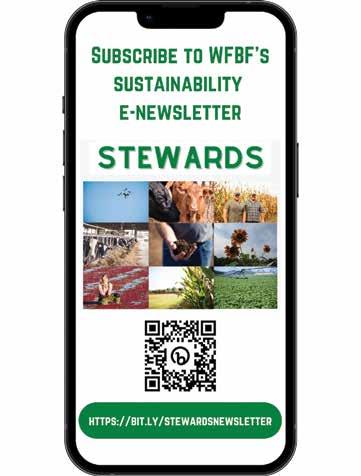
Acoalition of Wisconsin agricultural groups shared priorities they are seeking support for in the 2023-25 biennial state budget on Jan. 30.
“Wisconsin Farm Bureau and our fellow agricultural groups want to see a budget proposal best suited for Wisconsin’s farm families,” said Wisconsin Farm Bureau Federation Executive Director of Governmental Relations Jason Mugnaini. “Agriculture has a tremendous impact on our state’s economy, contributing $104.8 billion to industrial revenues annually and over 435,000 jobs. It is important that a state budget proposal reflects this impact.”
• Expanding economic development opportunities for rural communities by championing programs that insulate agriculture from market disruptions and help to grow the next generation of Wisconsin farmers.

“The 2021-23 State Budget was arguably one of the best budgets for the inclusion of agricultural provisions, thanks to the support of legislators, members of the Joint Committee on Finance and the Governor,” added Mugnaini. “We appreciate their acknowledgment of the importance agriculture has for the state of Wisconsin and look forward to working with them on our priorities in the next budget.”
Visit bit.ly/WisAgBudgetPriorities to read the full list of priorities and a complete list of ag coalition members.
16 WISCONSIN FARM BUREAU FEDERATION Rural Route ISSUES
Farm Bureau and John Deere Sign Right to Repair MOU
American Farm Bureau Federation and John Deere signed a memorandum of understanding on Jan. 8 that ensures farmers’ and ranchers’ right to repair their own farm equipment. The MOU, signed at the 2023 AFBF Convention in San Juan, Puerto Rico, is the culmination of several years of discussions between AFBF and John Deere.
“AFBF is pleased to announce this agreement with John Deere. It addresses a long-running issue for farmers and ranchers when it comes to accessing tools, information and resources while protecting John Deere’s intellectual property rights and ensuring equipment safety,” said AFBF President Zippy Duvall. “A piece of equipment is a major investment. Farmers must have the freedom to choose where equipment is repaired, or to repair it themselves, to help control costs. The MOU commits John Deere to ensuring farmers and independent repair facilities have access to many of the tools and software needed to grow the food, fuel and fiber America’s families rely on.”
David Gilmore, John Deere Senior Vice President, Ag & Turf Sales & Marketing said, “This agreement reaffirms the longstanding commitment Deere has made to ensure our

customers have the diagnostic tools and information they need to make many repairs to their machines. We look forward to working alongside the American Farm Bureau and our customers in the months and years ahead to ensure farmers continue to have the tools and resources to diagnose, maintain and repair their equipment.”
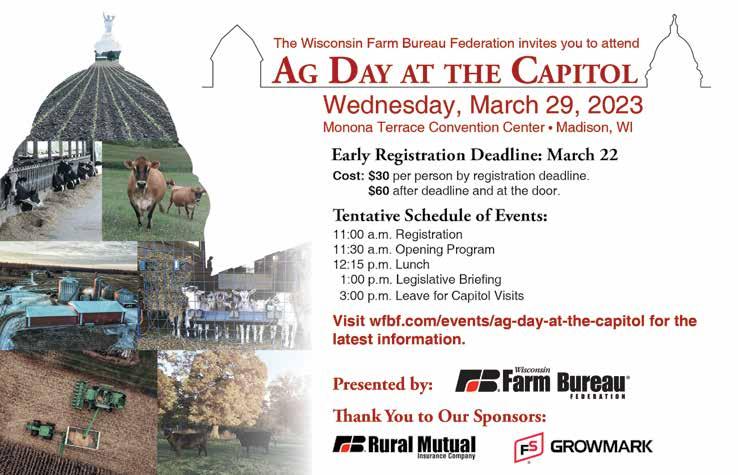
The MOU sets parameters and creates a mechanism to address farmers’ concerns. John Deere commits to engaging with farmers and dealers to resolve issues when they arise and agrees to meet with AFBF at least twice per year to evaluate progress.
The agreement formalizes farmers’ access to diagnostic and repair codes, as well as manuals (operator, parts, service) and product guides. It also ensures farmers will be able to purchase diagnostic tools directly from John Deere and receive assistance from the manufacturer when ordering parts and products.
The MOU has the potential to serve as a model for other manufacturers and AFBF has already begun those discussions.
17 wfbf.com FEBRUARY | MARCH 2023
By Marian Viney
When Savannah Brown was asked to write a goal statement during the Wisconsin Farm Bureau’s Leadership Institute, she wrote:
“My main purpose in life is to become the best version of myself while sharing all that I have to offer with family, friends and in my career. I want to be a voice for agriculture that needs no introduction and is easily recognized for my hard work ethic and positive impact on the world.”
Growing up in a single-parent home, Savannah could have focused on what she didn’t have; however, her determination to succeed and to help others sets hers apart.
THE BIG BROWN COW
Savannah was raised in Clark County by her father, Daniel Brown. Despite not being raised on a farm, her grandparents lived down the road from a dairy farm where she soon grew a love for Brown Swiss cows.

“I would do anything to go to the farm,” said Savannah. Savannah basically grew up on the 100 registered Brown Swiss farm, showing cows as an active member of the Disco Kids 4-H Club and Neillsville FFA.
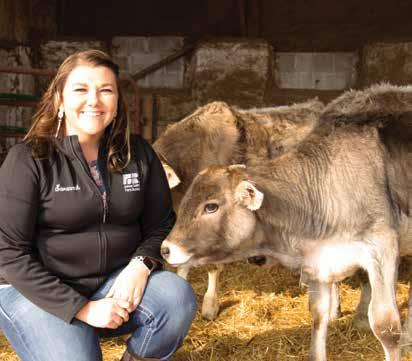
“Showing cattle taught me responsibility and accountability and instilled in me the joy of continuous learning,” said Savannah. “Being involved in FFA and 4-H taught me [many skills]. My FFA advisor was one of my best cheerleaders. She advocated for me and supported everything that I did.”
Savannah later attended UW-River Falls where she earned her bachelor’s degree in dairy science with a minor in agricultural business. While attending college she was active in the Association of Women in Agriculture, Dairy Club and Collegiate Farm Bureau. She also served as the Wisconsin Brown Swiss Queen in 2014.
After college, Savannah first worked for Foremost Farms before beginning her career with Land O’Lakes in Black River Falls in 2016. More than a half-century ago, Land O’Lakes developed the first calf milk replacer. Since then, the company has introduced many other firsts in milk replacers for calves, lambs, kids and foals.
In March 2020, she became plant manager for Land O’Lakes. “There are 35 employees who manufacture the world’s best milk replacer, with more than 40,000 tons produced and

WISCONSIN FARM BUREAU FEDERATION UNMATCHED
Savannah raises laying hens and sells the eggs to her coworkers at Land O’ Lakes.
CREDIT: CASSIE SONNENTAG
SUPPLIED PHOTO
CREDIT: MARIAN VINEY
shipped to places around the world,” said Savannah. “I love my new hat; I never know what the new day will bring.”
At the start of the pandemic, she started researching master’s degree programs.
“At a young age and as a female in a male-dominated career path, I found myself wanting to learn how to develop my leadership skills, lead a successful team and handle conflict using models and theories,” said Savannah. “I wanted to learn with like-minded people.”
With her trademark determination, Savannah took the maximum number of credits and completed the program in one year, earning her master’s degree in organizational leadership and development from Saint Joseph’s University in Philadelphia, Pennsylvania.
FALLING IN LOVE WITH FARM BUREAU
While participating in Collegiate Farm Bureau during college, Savannah was intrigued by the grassroots organization. As she became more involved at the county level, she realized how many activities members can get involved in.


She recalls attending a Young Farmer and Agriculturist event at a local brewery and receiving a Farm Bureau membership packet.
“Next thing I know, I’m serving on the county board of directors, involved in the Promotion and Education committee, serving as the county YFA chair, and participating in the county’s Agriculture in the Classroom, scholarship and Farm Neighbor Cares program committees,” laughed Savannah. “It’s the perfect opportunity to volunteer and to advocate for agriculture.”
One of her favorite county events was Christmas on the Farm.
“We served cookies and hot chocolate with Santa, had horsedrawn wagon rides and a cookie contest that involved FFA and 4-H members and raised money for a Land O’Lakes employee’s husband who was diagnosed with brain cancer,” added Savannah. “About 500 people attended. It was an amazing event.”
She is also a WFBF Leadership Institute graduate and recalled one of the most memorable events was traveling with the WFBF Board of Directors to Washington, D.C., to talk with legislators.
“I’ll admit I didn’t understand the many aspects of policy and I had to get comfortable with being uncomfortable,” said Savannah. “But the time spent with then WFBF President Jim Holte, other board members and Institute participants was invaluable.”
Savannah has several goals as she chairs the YFA Committee. “It will be a busy year with a relatively new position at work, serving as chair and serving on the board of directors,” said Savannah. “I hope to bring positivity and determination to succeed to each role.”
LOOKING TO THE FUTURE
With determination and knowing the tools for success, Savannah wants to continue to engage Farm Bureau members and advocate for agriculture.
“Someday, I hope to have a hobby farm,” said Savannah, “But right now, I’m enjoying my work and the staff, my leadership role with YFA, serving on the WFBF Board of Directors, having time to sit with family and friends playing Euchre or whatever the day may bring, and continuing to learn along the way.”
In all that she does, Savannah is determined to go above and beyond.
“I don’t want an ordinary life,” said Savannah. “I want an extraordinary one.”
19 wfbf.com
Savannah has three dogs, a Chocolate Labrador Retriever (Zoey); Chocolate Labrador Retriever/ Border Collie (Bella) and a Corgi (Stella).
CREDIT: MARIAN VINEY
CREDIT: CASSIE SONNENTAG
MARCH 17-18, 2023
Radisson Hotel and Conference Center | Fond du Lac
AGENDA
FRIDAY, MARCH 17
10:15 a.m. Registration Opens
11:00 a.m. Lunch and Opening Session; Keynote Speaker: Chris Hinrichs


1:00 p.m. Concurrent Breakouts
5:30 p.m. Dinner and Program
7:30 p.m. Entertainment; Midwest Dueling Pianos

SATURDAY, MARCH 18
8:00 a.m. General Session
Center for Food Integrity Consumer Insight Panel
10:45 a.m. General Session
Keynote Speaker: Jordan Henry
12:15 p.m. Lunch and Closing Remarks
For the latest information on speakers and workshops, visit wfbf.com/events/ag-lead-summit.
REGISTRATION
Early Bird Registration by February 17: $140 | After February 17: $175
Register online at bit.ly/2023AgLeadSummit.
HOTEL INFORMATION
Reserve by February 17.
Radisson Hotel and Conference Center
625 W Rolling Meadows Drive | Fond du Lac, WI 54937
Hotel Room Rate: $124 + tax
Call 1.920.6384175 and ask for the WFBF Ag LEAD Summit Group Block
Presented by: Insurance Company Rural Mutual
20 WISCONSIN FARM BUREAU FEDERATION Rural Route LEADERSHIP • ENGAGEMENT • ADVOCACY • DEVELOPMENT
Chris Hinrichs
Jordan Henry






21 wfbf.com FEBRUARY | MARCH 2023
VOLUNTEERS GEAR UP FOR MEMBERSHIP GROWTH IN 2023

The most common reason people give for not joining Farm Bureau is no one asked. With that in mind, Farm Bureau volunteers across Wisconsin are busy contacting friends and neighbors as part of this year’s ‘It Takes a Team’ membership campaign.
The 2023 campaign features a head-to-head competition among the nine Farm Bureau districts to sign up new and pastdue members, reach county membership goals and earn points toward winning the year-long competition.
In 2022, more than 150 Farm Bureau volunteers across Wisconsin signed at least one of their neighbors as a new Farm Bureau member and more than 550 people in Wisconsin joined Farm Bureau because they were invited to do so by a membership volunteer.
Anyone can sign up a new Farm Bureau member and there are many reasons to do so.

All Farm Bureau membership volunteers qualify for a $20 cash incentive for every new member signed. Even if you’ve never signed a new member before, you can qualify for the cash incentive simply by signing up a friend or neighbor. For a membership application, go to wfbf.com/membership/ application or call 800-261-FARM to request a supply of membership applications.
Not only does membership growth build the financial strength of Farm Bureau at the state and county level, but increased membership builds Farm Bureau’s influence with legislators and policymakers in Madison and Washington, D.C.
Finally, strong county Farm Bureaus depend on a strong and growing base of members who are willing to take part in county programs and provide input regarding issues that face Wisconsin farmers.
IT’S YOUR TURN!
22 WISCONSIN FARM BUREAU FEDERATION Rural Route
WILL
GAME ON! DISTRICT MEMBERSHIP STANDINGS 1st 20 points CENTRAL SEVEN 16 points 2nd 3rd 8 points 7 points 6th 3 points 8th 2 points 9th 6 points 7th
YOU BE A TEAM PLAYER?
Spotlight on Collegiate Farm Bureau
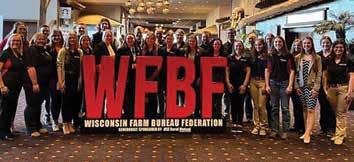
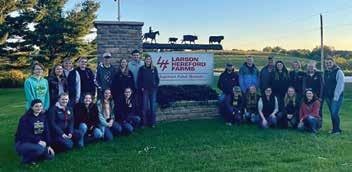
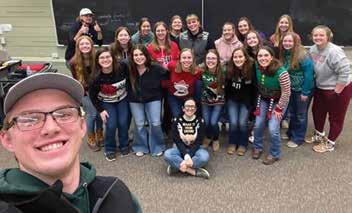


Name: Kendra Jentz
Year in School: Junior, UW-River Falls
Major: Agricultural Marketing Communications
Minor: Agricultural Business
Hometown: Burlington
Why did you decide to join Collegiate Farm Bureau?
Growing up, I had the opportunity to be involved with 4-H and FFA. This is where I found a sense of community and my love for agriculture. In college, I was looking for an opportunity that would provide me with the same type of experience. Consequently, a friend recommended that I join Collegiate Farm Bureau. I am grateful for the camaraderie, knowledge and memories that Collegiate Farm Bureau provides me. I strive to help each member find their place within our organization just like I did.
Give an update on what Collegiate Farm Bureau has done on campus and what is coming up for the spring semester.
This year we have nearly 80 members and our group has been quite busy. Whether it is connecting with industry professionals through farm tours, developing leadership skills through the Discussion Meet or helping the community by volunteering at White Pine Berry Farm, the UW-River Falls Collegiate Farm Bureau has made the most of every moment. Twenty-six of our members had the opportunity to attend the Young Farmer and Agriculturist Conference in December.
During the spring semester, we are ecstatic to bring many more opportunities to our members including speakers, tours and experiences through a variety of other avenues. We will be hosting our 11th Ag Day on Campus on April 18. We are
excited to honor our agricultural traditions and look forward to a stronger, sustainable future with this year’s theme of ‘Deep Roots, Bright Future’. Additionally, we are looking forward to Michelle Stangler representing Wisconsin in the National Collegiate Discussion Meet in March during the FUSION Conference in Jacksonville, Florida. We are delighted to have so many opportunities to connect, advocate and grow within the field of agriculture this year.

23 wfbf.com FEBRUARY | MARCH 2023
Fond du Lac County Member Saves with Ford Benefit

Fond du Lac County Farm Bureau board member, Rural Mutual Insurance policy holder and former fifth-generation dairy farmer Jim Kelroy took advantage of the Ford Farm Bureau member benefit for the first time to purchase a F-150 XLT truck from Countryside Ford in Columbus, now Napleton Ford.
“If you are looking for a new Ford vehicle, purchasing a Farm Bureau membership for $50 to $60 to save $500 certainly makes sense.”
- Jim Kelroy
The Farm Bureau Ford Bonus Cash is exclusive for active Farm Bureau members who are residents of the United States. Members receive $500 Bonus Cash on the purchase or lease of an eligible new 2021/2022/2023 Ford Maverick, Ranger, F-150 or Super Duty®. Some customer and purchase eligibility restrictions apply.
Jim and his wife, Marlene, have been Farm Bureau members for more than 40 years. Jim is semi-retired with several part-time jobs including crop adjuster, seed salesman and provides parttime relief for area sales managers at CentralStar Cooperative. The Kelroys have two adult sons and five grandchildren.
“This was our first time using the Ford Farm Bureau benefit and it was extremely easy to use,” said Jim. “Our salesperson was fully aware of the Farm Bureau discount and wasn’t too pushy. It was a great buying experience.”
Jim added that he saved $500 off the final agreed on price.
“I’ve shared my experience with the Farm Bureau member benefit with anyone who has asked about my new truck, hopefully encouraging additional members if he or she isn’t a member already,” said Kelroy. “If you are looking for a new Ford vehicle, purchasing a Farm Bureau membership for $50 to $60 to save $500 certainly makes sense.”
Jim added that he has used other Farm Bureau member benefits, such as carrying Rural Mutual Insurance coverage on his family’s farm and other member benefits when the opportunity exists.

You must be a Farm Bureau member for 30 consecutive days prior to purchase or lease and take new retail delivery from an authorized Ford Dealer’s stock by Jan. 3, 2024.
For more information, visit wfbf. com/membership/member-benefits, visit FordFarmBureauAdvantage.com or see your authorized Ford Dealer for qualifications and complete details.

24 WISCONSIN FARM BUREAU FEDERATION Rural
Route
MEMBERSHIP
SUPPLIED PHOTO
Your Farm Bureau Member Benefit

Savings Savings
Farm Bureau $500 Exclusive Cash Reward offer for new 2021/ 2022/2023 Ford Ranger, Maverick, F-150, and Super Duty (to F-550). Must be a member for 30 days. Visit fordfarmbureauadvantage.com for complete details or to print your certificate.
Through an exclusive program offered by Yamaha Motor Corp., USA, Farm Bureau members receive a $250 pre-paid debit card with the purchase of select 4WD ATV, Side-by-Side and Snowmobile models. Fill out the rebate form at bit.ly/3inykme. You need your Farm Bureau member number to complete the form.
*You must be a paid Wisconsin Farm Bureau member at time of purchase to receive the $250 rebate.

You can get more information about the services Farm Bureau Financial offers from your local Rural Insurance agent. Learn more at fbfs.com.
Members receive an incentive discount (up to $500) when purchasing qualifying Case IH equipment from participating dealers.
To find a Rural Mutual Insurance Company agent, visit ruralmutual.com or call 877.219.9550.

Wisconsin Farm Bureau members save up to 20% off published rates at participating Choice Hotels.


Farm Bureau members who are agricultural producers and patrons of their local FS cooperative are eligible to receive patronage when patronage is paid.
Take advantage of Farm Bureau Bank’s FDIC-insured checking, savings and money market accounts, certificates of deposit, credit cards and vehicle and home loans. Visit farmbureau.bank.
MEMBERSHIP DOESN’T COST, IT PAYS.
Members qualify for a variety of discounts on new purchases. Visit wfbf.com to print your certificate and for details on models and discounts. Must be a member for at least 30 days to be eligible.
Wisconsin Farm Bureau members save up to 20% off published rates at participating Wyndham Hotels.

*WFBF member benefits may be changed or discontinued at anytime without notice.*

For complete details, visit wfbf.com/membership/member-benefits.

25 wfbf.com FEBRUARY | MARCH 2023
Insurance Company
Rural Mutual
• AgriVisor • Life Line
•
•
•
$500
• Avis • AgriPlan
Reimbursement
•
•
Member Protector Policy
Screening
John Deere
Grainger
ScriptSave
Reward Protection Program
Medical
Program
ODP
Budget
YOUR
WITH WINNEBAGO COUNTY’S
JENNY LEAHY 5MINUTES
By Marian Viney
Please share a little about yourself.
I grew-up on my family’s dairy farm in Fond du Lac County and attended UW-Oshkosh where I earned a bachelor’s and master’s degree in education. Recently, I started my 13th year of teaching social studies at Berlin High School. On weekends and during the summer, I also help on the farm. In my spare time, I enjoy gardening and home projects.
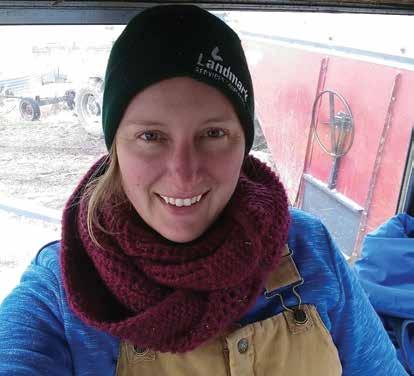
When you were growing up what did you want to be?
I wanted to be a veterinarian when I was younger, but decided education was the path for me when I took a class in high school to become a daycare teacher.
What are some of the challenges you face as a teacher?
Student apathy is challenging to deal with because it is contagious in a classroom. It’s difficult for some students to see the value in education, so they give into the distractions around them.
What are some of the successes that you are most proud of?
Over the years, I have had a number of former students reach out to let me know that my classes helped them decide what they wanted to do with their lives. I also developed our economics curriculum and pushed that at least six weeks of the semester was spent on financial literacy.
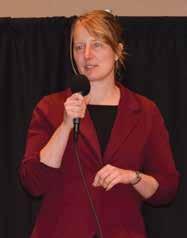
You are a past participant in the YFA Discussion Meet. Please share your experience.
I enjoyed participating in the YFA Discussion Meet because it provided a great opportunity to meet other members from all around the state. I enjoyed digging into the topics that questions brought up.
What is one agricultural experience that has defined you?
Raising calves on my family’s farm. From eighth grade until I was hired full-time at Berlin, I was responsible for caring for the calves. It taught me that what you do and how you do it matters. It isn’t calves anymore, but my students rely on me to bring my best every day.

What is one Farm Bureau experience that you are most proud of?
Being responsible for the Farm Bureau booth at the Alto Fair gives me the opportunity to connect with people from all walks of life to agriculture.
What is something that many Farm Bureau members do not know about you?

I built and landscaped my patio almost entirely by myself. Is there anything else that you want to add?
Recently, I completed my 15th year as a counselor with the American Legion Auxiliary Badger Girls State program, a program teaches junior girls in each state about government by conducting a simulation of the three levels of state government.
26 WISCONSIN FARM BUREAU FEDERATION Rural Route




27 wfbf.com FEBRUARY | MARCH 2023
Planting the Seeds for Success
 A Message from WFBF President Kevin Krentz
A Message from WFBF President Kevin Krentz
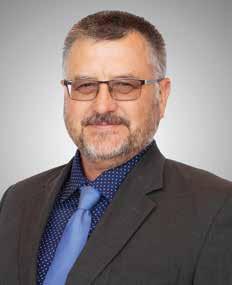
work. Our next generation and the values we pass on have always been our greatest crop.
We carry those same values in Farm Bureau - continued improvement, support and advocacy on behalf of our members. We provide training and the tools needed for the next generation of leaders for our organization and our communities.
Wisconsin Farm Bureau’s Leadership Institute just began its 2023 session. This is WFBF’s premiere leadership training program that members of all ages can apply to be a part of. The goal is to not only help members on their personal growth journey but also build new leaders for our organization and our communities.
As farmers, we plant seeds and nurture our crops; we care for our livestock, celebrate the victories of life and we feel the pain of death. No one said farming was easy, but when one has a successful crop or nurtures a calf back to health, there is no better feeling.
Our successes come from fostering and supporting. That includes our families. On farms, our children grow up working beside us. They see the struggles of a tough day and celebrate our successes with us. Farm kids have great work ethics because they understand the joys of caring for animals and the accomplishments of a hard day’s
Farm Bureau stands up for our farmers to help weather the storms of the everchanging regulations affecting agriculture. Technology advancements have helped not only communicate with elected officials but also with consumers in telling the story of our farmers. There are a ton of ways members can lead in regard to agriculture advocacy and Farm Bureau is here to support.
The WFBF Young Farmer and Agriculturist program gives members ages 18 to 35 many opportunities to network, discuss key issues affecting agriculture and build a base to advocate on behalf of agriculture. Many other state Farm Bureaus envy the excitement and engagement we have from this group of members.
But Farm Bureau is much more than that. We have something for all ages. From conferences to programs, we carry a wide range of training and educational opportunities.
Next generations have always been able to adapt and thrive in the everchanging world of agriculture. My father farmed differently than his father, I farm differently than my father and my son will continue that trend. With each generation, we have been able to become more productive, provide a better life for our families and protect the environment around us. Farming isn’t always easy, but we put our hearts and souls into feeding an ever-growing population.
Farm Bureau has thrived for over a century by gaining respect in Madison and Washington, D.C., fighting for the needs of agriculture, helping carry the farm story to consumers and inspiring new leaders. Like the farmers we represent, Farm Bureau plants seeds. Let’s plant seeds of hope, vision and success with a great crop of young leaders.
28 WISCONSIN FARM BUREAU FEDERATION Rural Route VOICES
Krentz was elected president of Wisconsin Farm Bureau in 2020. He is a dairy farmer from Berlin.
New Year, New Congress A Message from AFBF President Zippy Duvall
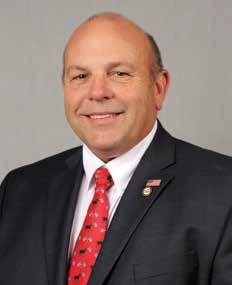

than ever before to reach out to new members representing urban districts, too.
Recently, the 118th Congress was sworn in. These elected officials, chosen by the American people in November, will spend the next two years debating the issues that matter most to all of us. Voters sent 81 people to Congress for the first time. They’ll have to learn the ropes and put in extra time to understand the issues.
Part of our responsibility as Farm Bureau, and as farmers and ranchers, is to reach out and engage with these new members about the work happening on farms and ranches in their districts, their states, and across the country. We have our work cut out for us. There are fewer people representing rural America than ever before, making it more important
Our work in every Congress is important, and it’s even more important when it’s time to renew the farm bill. Programs in this legislation are critical to American agriculture. One of our greatest challenges this year is ensuring members understand these programs and why they are essential. Almost half of Congress, 260 members, were not in Congress when the 2018 farm bill was passed. We have to put in the extra work to ensure they understand the importance of farm bill programs that help farmers and ranchers manage risk, why conservation programs are and should continue to be voluntary and science-based, and why it’s critical that farm policy and nutrition policy remain united in the farm bill, among many other priorities.
One of the greatest limiting factors American agriculture faces is the lack of workers. Across farm country and in the windows of businesses large and small, you’ll see help wanted signs. Farmers need Congress to fix the H-2A visa program to provide more accessibility and affordability. We also need a new yearround farmworker program for jobs that are done every day – like milking cows. As with any other issue, and especially with this Congress, a meaningful and bipartisan policy solution must be the outcome that we strive to achieve sooner rather than later.
There are many other important issues farmers and ranchers are counting on Congress and the executive branch to advance this year. Broadband must be expanded and access improved in rural communities. Programs to advance climate-smart farming practices must be science-based and market-driven. And Congress and the Administration must understand that the only way to meet big goals related to sustainability and addressing hunger is by ensuring farmers continue to have a variety of crop protection tools. The Administration must also step up in a bigger way to pursue trade deals that will open markets to U.S. farmers and ranchers. And we’ll hold the Administration’s feet to the fire when it comes to enforcing trade deals like the USMCA.
We’re looking forward to working with this Congress to deliver solutions to the challenges farmers and ranchers face. I hope that our elected officials will come together, set politics aside, and engage in meaningful discussions about these issues. We need them to do just that - because the challenges we face now, and the ones that lay ahead, will take buy-in from both parties to solve in a manner that will stand the test of time.
29 wfbf.com FEBRUARY | MARCH 2023
President of the American Farm Bureau Federation, Duvall raises beef cattle, hay and poultry in Greshamville, Georgia.
A Seat at the Table for Sustainability Conversations
A Message from WFBF’s Rachel Gerbitz
Sustainable Ag Summit –Glendale, Arizona

The Sustainable Agriculture Summit was hosted by Field to Market and the Innovation Center for U.S. Dairy. The summit is the premier sustainability event for and by agriculture. Organizations throughout the food supply chain were represented to learn, develop and advance a shared vision for the future of agriculture.
Cover Crops and Discovery Farms Conference – Wisconsin Dells
UW-Extension and Discovery Farms brought sustainability closer to home with the joint Cover Crops and Discovery Farms Conferences.
Does it seem like everyone is talking about sustainability? They are.
We are at a pivotal moment in agriculture to adopt new practices and management styles to maintain and expand production levels to feed a growing population. There is no such thing as too many conversations about protecting water quality or enhancing soil health.
We should be engaging in conversations with our peers, business partners and legislators about our efforts to preserve and enhance our resources.
Conferences provide an excellent opportunity for farmers and agriculturists to set goals and make plans for the new year. Gathering to share ideas and network with peers, experts, neighbors and friends is a springboard for progress. During fall and winter, I attended several conferences. The opportunity to engage in and be present for conversations happening around sustainability was invaluable as I prepare to share your stories in 2023.
Sessions helped to define the nuanced ‘sustainability’ term and outline priorities as we advance towards our goals. Attendees were challenged to think of sustainability in terms of productivity and efficiency as well as environmentally. We share common goals across the supply chain, and we must meet the moment to protect the future of agriculture and feed a growing population.
Big Soil Health Event – Cedar Falls, Iowa
The Big Soil Health Event hosted by SoilRegen was a ground-up educational experience for farmers, landowners and agriculture professionals. The conference encouraged and illuminated soil health practice adoption.
Firsthand testimonials from other farmers provided practical boots-onthe-ground training for new farmers and early adopters of regenerative agriculture. Sessions explored how soil health principles can benefit your bottom line. There is no one-size-fits-all regenerative agriculture practice, but farmers and landowners left inspired to try something new on their farm and continue ideasharing with their neighbors and communities.
During this conference, attendees explored the variability of soils across Wisconsin and heard firsthand testimonies from the farmers and researchers on the frontlines of innovation.
During the cover crops portion of the conference, attendees heard from farmers about the practices and cover crop blends used on their farms.
The Discovery Farms portion of the conference explored nitrogen utilization and management. Attendance has grown significantly in the short tenure of the Cover Crops and Discovery Farms Conferences, proving that interest in sustainability and conservation is greater than ever and we are making progress towards our sustainability goals.
As we continue to innovate toward our own sustainability goals it is important to be present where these conversations are taking place. I’m honored to represent Wisconsin Farm Bureau members at events and conferences to share your stories and bring ideas home to you.
What events do you attend to engage on these topics? Don’t be left out of the sustainability conversation.
Gerbitz is WFBF’s Director of Sustainability Communications and Partnerships. In this role, she oversees the organization’s sustainability communication efforts.
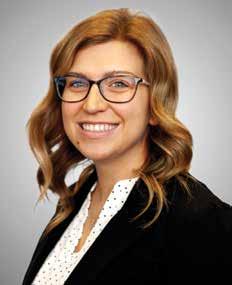
30 WISCONSIN FARM BUREAU FEDERATION Rural Route VOICES
Understanding the DNR Wolf Management Plan
A Message from WFBF’s Tyler Wenzlaff

also constituted a Wolf Management Committee.
Wisconsin Farm Bureau Federation was represented on the committee by District 8 Board Director Ryan Klussendorf, along with 28 other organizations and Tribal Governments from around the state. The committee was constituted in the spring of 2021 with the purpose of providing input to the DNR during the development of an updated management plan.
Farm Bureau advocated for rural residents and specifically requested maintaining the current numeric population goal of 350 with zone specific quotas to reduce wolf-related conflicts from high agriculture production areas.
It’s been almost a year since a Northern California District Court judge restored protection for the gray wolf.
The judge found that United States Fish and Wildlife Service had errored when it determined gray wolf populations had been restored to sustainable population levels.
In response, the Wisconsin Department of Natural Resources suspended Wisconsin’s annual wolf hunt indefinitely meaning the traditional wolf harvest season beginning in November did not take place. The department
The DNR released a draft management plan on Nov. 9, 2022, with an open public comment period until Feb. 28, 2023. This is a comprehensive wolf management plan that will replace the original plan put in place in 1999. Prior to this process, the Wisconsin Wolf Management Plan underwent a review process in 2005-2006 and was last updated in 2007.
Wisconsin Farm Bureau has numerous concerns with the draft plan. The previous plan had a wolf population goal of 350, which WFBF supports in the organization’s state policy. Unfortunately,

the DNR has moved away from a population goal, instead favoring a more holistic approach relying on fundamental goals and objectives. While WFBF supports many of the objectives contained in the plan, without a target population number it is difficult identify success.
The new draft plan considerably expands Zone 4 into Marathon County and central parts of the state previously designated as inappropriate habitat for wolves. This area of the state is now designated as a secondary range for wolves, greatly expanding suitable habitat for wolves in the state and putting additional farms at risk of depredation.
The review process is the next step in what the DNR has promised will be an extensive public input process. WFBF will be filing formal comments to the department and encourages members to review the plan and file comments as well.
The formal comment period ends on Feb. 28 and can be filed via the department’s Online Comment Tool (surveymonkey.com/r/DC2M8W6).
31 wfbf.com FEBRUARY | MARCH 2023
Wenzlaff serves as WFBF’s Director of National Affairs focusing on federal issues.
Markets Prepare for Spring A Guest Column by AgriVisor’s Karl Setzer
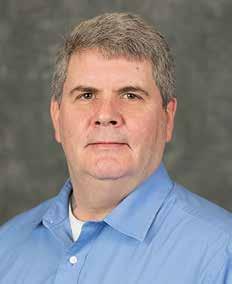

data. Given current market economics, this level of corn planting may be hard to achieve.
Soybean planting this year is currently expected to come in close to 90 million acres compared to 87.5 million a year ago. Wheat acres are also expected to increase from 45.7 million last year to 47 million this year. Acres are coming out of reserve programs and when combined with more favorable spring weather we are seeing higher expectations for all crops. There is less concern over these acres as larger global crops of soybeans and wheat are lessening the demand for U.S. products in the global market.
has trimmed its old crop corn export forecast but is still holding to an elevated domestic projection. This is questionable as ethanol consumption has decreased in recent weeks and feed demand is seeing more use of low-grade wheat. Corn exports remain sluggish as well as the U.S. remains the highest-priced source for coverage in the global market. Soybean demand remains high but will fade once Brazil starts to increase the exports of its record crop.
Bottom line, the volatility we have seen in the U.S. commodity market is unlikely to subside anytime soon and will likely increase instead.
We are still in the midst of the winter months across the U.S. but market attention is starting to shift to spring and the upcoming planting season. As this transition takes place, we start to see a shift in market focus for price discovery, with more emphasis on acreage, input demand and, of course, weather.
The most interest heading into the spring planting season in the United States is on acreage, mainly on corn. Last year, U.S. farmers seeded 88.6 million acres of corn and harvested 79.2 million. Drought cut into U.S. corn acres and production in the U.S. Plains, compounding issues from the previous year when losses were seen in the Upper Plains and Midwest. As a result, analysts believe that, given current corn reserves and projected demand, U.S. farmers will need to seed 94 million acres this year. This is well above the 92 million acres the USDA projected in its baseline
One benefit for corn acre potential this year is declining input costs, mainly fertilizer. Fertilizer values remain well above historical averages but have softened in recent months. When combined with a favorable price spread to soybeans, more farmers may look at planting corn, especially with more favorable weather outlooks.
As we move closer to spring, we are starting to see more favorable weather in several regions of the United States, particularly those that have been suffering from drought. Southern U.S. states have suffered from drought conditions for the past few years as there has been a La Niña weather event in place. This is finally starting to diminish and is expected to be gone by early summer. As this fades the odds of more normal rainfall patterns increase. In turn, this has increased the odds of better U.S. yields. Not all market attention will turn to production in the near future, however. While a top news story, trade will still be focused on old crop demand. The USDA
RISK DISCLAIMER:
The risk of loss in trading commodity futures and options is substantial. Before trading, you should carefully consider your financial position to determine if futures trading is appropriate. When trading futures and/ or options, it is possible to lose more than the full value of your account. All funds committed should be risk capital. Past performance is not necessarily indicative of future results. The information contained in this report is believed to be reliable but is not guaranteed to accuracy or completeness by AgriVisor, LLC. This report is provided for informational purposes only and is not furnished for the purpose of, nor intended to be relied upon for specific trading in commodities herein named. This is not independent research and is provided as a service. As such, this is considered a solicitation.
32 WISCONSIN FARM BUREAU FEDERATION Rural Route
VOICES
Setzer is the commodity risk analyst for AgriVisor, one of WFBF’s member benefits.
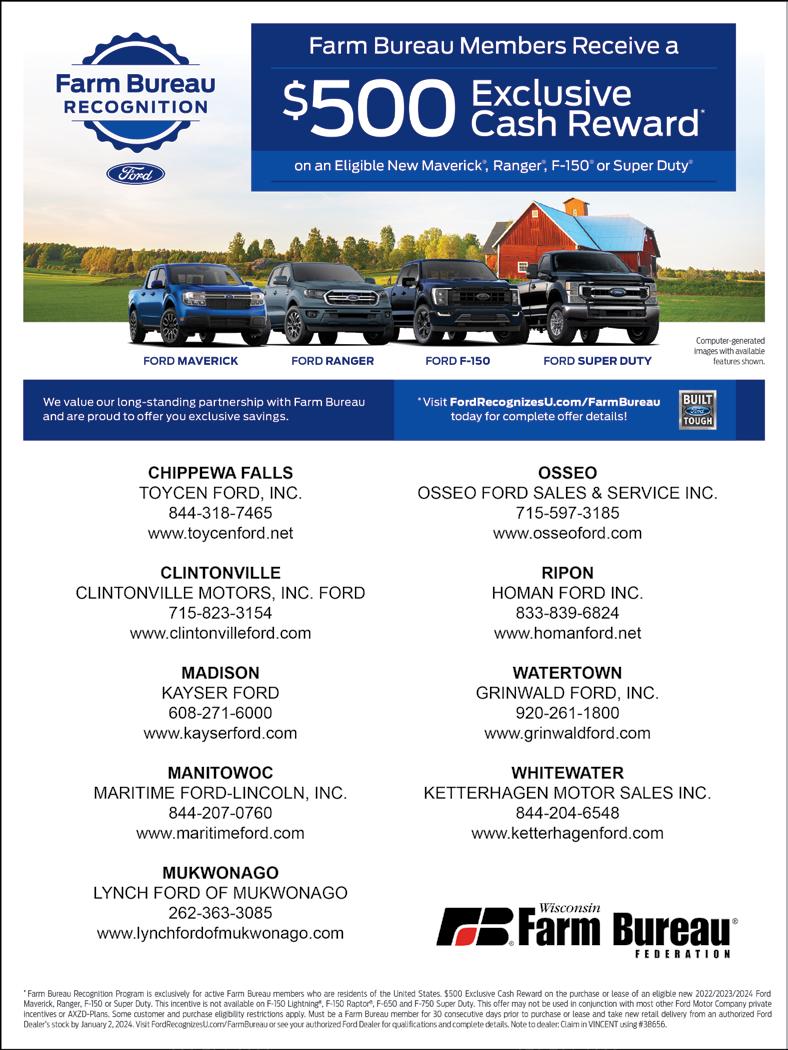 With Kari Schoenike
With Kari Schoenike
Reworking New Year’s Resolutions with Open Minds and Hearts
As we embark on the journey of 2023, there is often a push to set goals or resolutions to be a better version of oneself. Many people, myself included, fall victim to societal pressures of creating a lofty list of well-intentioned goals. One of the many challenges with goal setting is that not reaching goals as they are written leads to feelings of inadequacy and failure. When we miss a day of our new workout routine or find the profit margin for our new farm store was too narrow, we scrap the entire goal instead of reframing it or allowing ourselves an opportunity to try again.
Consider transitioning your mindset as you go about creating your Promotion and Education goals for the coming year.
This was sold as a recipe for success. In cases of perceived failure, not working hard enough, not being motivated enough, or not focusing on the big picture were blamed as culprits. While there is value to this hardline approach to motivate positive change, a shift in perspective may offer us more opportunities for success.
Transitioning from SMART goals to FUN goals
Emily Ladau, author and podcast host, encourages people to shift their focus from SMART goals to FUN goals.

F – Flexible – Remember that people, situations and environments change.
U – Uplifting – Goals are meant as motivation for personal and professional improvement, not as something that makes you dread getting up in the morning.
N – Numberless – According to Ladau, “nothing will be radically different if [she] read[s] 29 books this year instead of 30.”
Ladau also states that “we could all benefit from being kinder to ourselves” and recognizes that goals are not meant as punishment but as motivation.
Open Your Mind and Heart to New Possibilities
Sometimes the goals we start the year with no longer apply as time goes on. Maybe something else is more pressing. Maybe after a few weeks of attempting something, we recognize it does not hold the value we thought it did. Keep an open mind and open heart to make changes and try new things. Sometimes we don’t know what we need until it’s in front of us, so we need to keep putting ourselves out there … even if it is scary.
SMART Goal Setting

When many of us were first formally taught goal setting, we were taught to set SMART goals:
S – Specific
M – Measurable
A – Achievable
R – Realistic
T – Timebound
One thing I am personally working on in 2023 is allowing myself the grace and space to make mistakes, reflect and grow. I am consciously reminding myself that we make the best decisions we can with the information we have at any given time. If I receive new information that shows me something different, it’s never too late to make a change. Keeping an open mind and open heart will set you apart as you evaluate your annual goals.
Kari Schoenike is the District 2 Representative on the WFBF Promotion and Education Committee. Kari grew up on her family’s crop farm in rural Dodge County. She is the Agriculture Education Manager at Wisconsin State Fair working to promote agriculture-focused educational opportunities for exhibitors and fairgoers.
The Promotion and Education Committee is a dynamic group of Farm Bureau leaders who develop, implement and promote programs that build agricultural awareness and provide leadership development to the agricultural community.
34 WISCONSIN FARM BUREAU FEDERATION
Promotion and Education Program
Farm Bureau
Mixed Berry LaClare Goat Cheese Cheesecake
Ingredients
Crust:
• 6 Tbsp. butter, melted
• 1½ c. graham cracker crumbs
• ¼ c. sugar
• pinch of kosher salt
Filling:
• 16 oz. cream cheese, at room temperature
• 12 oz. LaClare original chevre
• 1½ c. sour cream, at room temperature
Directions
1. Preheat oven to 350 degrees.
• 4 large eggs, at room temperature
• 1¼ c. sugar
• 2 tsp. vanilla extract
• ¼ tsp. ground cinnamon
• ¼ tsp. ground nutmeg
• ¼ c. honey
Garnish:
• ½ c. honey
• 1 c. fresh blackberries
• 1 c. fresh raspberries
2. Line the bottom of a 9-inch springform pan with parchment paper and grease the sides of the pan.
3. In a large mixing bowl, combine butter, cracker crumbs, sugar and salt until well combined.
4. Using your fingers, press mixture into bottom of pan and halfway up the sides.
5. Bake 7 minutes. Remove from oven and set aside.
6. Reduce oven temperature to 300 degrees.
7. In a large mixing bowl, use paddle attachment to beat cream cheese and goat cheese together until fluffy. Add sour cream, sugar, vanilla, cinnamon, nutmeg and honey until combined. Add eggs one at a time, making sure it’s fully incorporated before adding the next
8. Once the batter is completely smooth, pour filling into the center of the crust and tap the pan on the counter for 30-45 seconds to remove as many air bubbles as possible.
9. Add 6 c. boiling water to a 9x13-inch pan. Place pan on bottom rack of oven. Immediately place the cheesecake on oven’s upper rack and bake for 60-75 minutes until the edges of cheesecake are set. A slight jiggle in the center of the cheesecake is ok.
10. Turn oven off and prop door open. Keep in oven for 1 hour.
11. Remove from oven and let cool completely.
12. Refrigerate cheesecake overnight.
13. To serve, top with honey, blackberries and raspberries.

Recipes and photos courtesy of Clara Hedrich, recipes.laclarefamilycreamery.com/recipes.
Whipped Everything Bagel Goat Cheese Spread
Ingredients
• 8 oz. LaClare Everything Bagel
Goat Cheese (chèvre)
• 4 oz. cream cheese
• 1 clove garlic
• 2 Tbsp. extra virgin olive oil
• 1 Tbsp. lemon juice
• 1 Tbsp. lemon zest
• ½ tsp. salt
• ½ tsp. black pepper
Directions
• 2 Tbsp. fresh parsley
• crackers, vegetables or baguette, for serving
1. Add all ingredients to the bowl of a food processor, pulse until combined.
2. Serve with crackers, vegetables, or a fresh baguette. Dip can be made up to two days in advance by storing covered in the fridge.
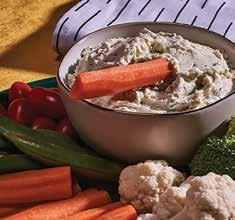
Baked Goat
Cheese Mac and Cheese
Ingredients
• ½ lb. macaroni – cavatappi, shells or elbows

• 2 Tbsp. butter
• 2 Tbsp. all-purpose flour
• 2 c. milk
• 6 oz. LaClare Original Goat
Cheese (chèvre)
• Kosher salt
• ½ tsp. fresh black pepper
• 1 tsp. dried oregano
• ½ tsp. dried thyme
• ½ tsp. red pepper flakes
• ⅛ tsp. grated nutmeg
Directions
1. Preheat oven to 350 degrees.
• ½ c. Italian seasoned panko breadcrumbs
2. Bring a large pot of heavily salted water to a boil. Add pasta. Cook to al dente according to package instructions. Drain.
3. In saucepan on medium heat, melt butter. Once melted, add flour and whisk until flour is incorporated. Cook, whisking continuously, until roux turns golden brown.
4. Slowly add milk, whisking until all milk is combined.
5. Add goat cheese, pinch of salt, black pepper, oregano, thyme, red pepper flakes and nutmeg.
6. Add drained pasta to sauce and stir to coat.
7. Pour pasta and sauce into an 8x8 baking dish. Top with breadcrumbs.
8. Bake for 25 to 30 minutes until breadcrumbs are golden brown.
35 wfbf.com FEBRUARY | MARCH 2023
Grassroots in Action
Farm Bureau prides itself on being a grassroots organization. Members belong to one of the 61 county Farm Bureaus. Throughout the state, local members advocate for Farm Bureau and agriculture in a variety of ways. Here are some of the activities and projects happening locally.

Jefferson County Christmas Neighbors Program

Crawford County Presents 4-H Key Award

In December, the Jefferson County Farm Bureau Board of Directors adopted a family of four from the Fort Atkinson area through the Jefferson County Christmas Neighbors program. Gifts were purchased for the entire family. All the fixings for a holiday meal were also provided. For more than 60 years, this program has served hundreds of families and nearly 2,000 children in communities throughout Jefferson County.
District 2 Youth Ag Summit

The county Farm Bureaus in District
2 hosted the annual Youth Ag Summit on Dec. 7 at Kuhn North America in Brodhead. A total of 75 FFA students from 13 schools across the district participated in this educational event. A panel discussion shared advice and discussed skills needed to pursue a future career in agriculture. Students learned about diverse agriculture careers through the Kuhn North America tour and breakout sessions. Breakout session speakers included: Dustin Williams, Agribusiness and Farm Management Instructor at Blackhawk Technical College in Monroe; Erik Huschitt, CEO and General Manager of Badger State Ethanol; and Steve Stettler, President of Decatur Dairy Inc. After lunch, students listened to keynote speaker Carrie Mess, ‘Dairy Carrie’, who presented an engaging topic comparing pizza and building life skills for agriculture careers.
Farm Bureau annually sponsors the prestigious 4-H Key Award, the highest honor a 4-H member can receive. Youth receiving this award have demonstrated consistent growth in 4-H involvement, developed and applied leadership skills and actively participated in the functions of the club and community. Crawford County Farm Bureau board director Mary Jo Johnsrude had the honor of presenting the award to this year’s winners, Lily Mitchell of the Steuben River Runners 4-H Club and Gracie Sime of the Happy Hi-liters 4-H Club.
Marquette County Harvest Dinner
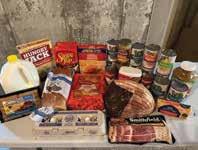
The Marquette County Young Farmer and Agriculturist Committee hosted a Harvest Dinner for YFA members and their families on Nov. 12 at Kaycee and Jordan Bittelman’s home.

Tri-County Trap Shoot
Farm Bureau YFA members from Adams, Juneau and Vernon counties gathered for trapshooting on Oct. 2 at Kendall Sportsman’s Club. Members had a fun afternoon while socializing and enjoying some friendly competition.

36 WISCONSIN FARM BUREAU FEDERATION Rural Route
Buffalo County Calf Grant Project


The Buffalo County Farm Bureau calf grant project celebrated more than forty years of successfully starting young farmers in the cattle business. Grant applications are open to Buffalo and Pepin County 4-H and FFA members between the ages of 11 and 16. The grant offers $300 toward the purchase of a dairy heifer calf for the member to show. Applications are due in spring. This year, Buffalo County Farm Bureau presented its calf grant to Cecelia Dittrich, daughter of Don and Billie Dittrich, of the Golden Hornets 4-H club.
Waupaca County Miracle on Bridge Street Event
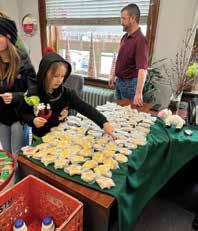
Waupaca County Farm Bureau supplied a tasty and nutritious treat to children and adults alike at the second annual Miracle on Bridge Street event in Manawa on Dec.10, 2022. More than 300 children visited the station set up with Santa and milk and cookies. The milk and cookies were sponsored by the county’s Promotion and Education committee.
Outagamie County Dairy Promotion at Oktoberfest
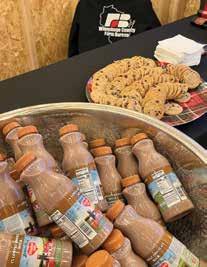

Outagamie County Farm Bureau had a successful dairy promotion and fundraiser at Appleton’s Oktoberfest on Sept. 24, 2022, selling 1,180 cream puffs. About 30 members helped make the one-day event a success by helping set up, whipping cream, filling the cream puff shells and working the sales counter. The money raised at the event will help support Agriculture in the Classroom, 4-H, FFA and other agricultural programs in Outagamie County.
Waushara County Holiday Parade Float
The Waushara County Farm Bureau assembled a float promoting Farm Bureau for the city of Wautoma’s Holiday Parade held on Dec. 1, 2022.
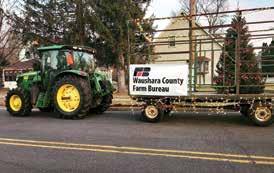
Winnebago County Winter Dairy Promotions
Winnebago Dairy Promotion got into the holiday spirit in December while handing out milk and cookies for kids that visited Santa at Brighton Acres Christmas Village in Oshkosh. This was the first year the county Farm Bureau hosted this event and it was a huge success. That same weekend, county volunteers also handed out milk to racers after the Race for the Light 5K. The race helped raise funds for the Christine Anne Center. Finally, Winnebago County also sponsored milk for families that participated in the Rotary Club Parent Connection Christmas Party at the YMCA.
Grant County Makes Ag Education a Priority at County Fair
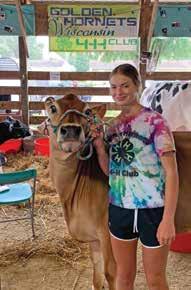
The Grant County Farm Bureau Ag Education Tent draws in fairgoers of all ages by testing their agriculture knowledge and providing opportunities to learn more about Wisconsin agriculture. The county fair attraction offers interactive presentations, cheese sampling, project demonstrations, trivia games, visits with farm animals and guaranteed fun for the whole family.

37 wfbf.com FEBRUARY | MARCH 2023
Spotlight on Farmer Angel Network
How did the Farmer Angel Network get its start?

In the fall of 2018, the Sauk County community pulled together after a farmer died by suicide. During this challenging time, community members reached out to the family to comfort, support and listen as they worked through the emotions that followed. As some community members chatted about the extreme sadness and feeling of helplessness surrounding the family and community, a farmer shared they had also suffered from severe depression and battled many thoughts of suicide in the past. At this point, they realized there was a need to support the community and families in similar situations. The community knew something needed to be done.
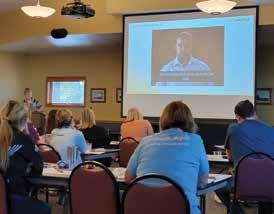

During the winter months, they created a safe space to come together and talk about farm stress and suicide over the lunch hour. They brought in speakers and resources to listen to and utilize during these difficult times. The farmer's family and other community members decided to share their stories to help others learn about farm stress and mental health concerns in rural communities, and Farmer Angel Network was formed.
What is the mission of Farmer Angel Network?
The mission of Farmer Angel Network is to serve as a model of how thriving rural communities appreciate and celebrate agriculture through fellowship in order to decrease the stigma of mental health, and promote the health of its farming community as an asset to community wellness.

What are your areas of focus?
The Farmer Angel Network builds strong rural communities that support agriculture by providing education, resources and fellowship with a focus on mental wellness and suicide prevention in Sauk County and surrounding areas. This group includes farmers, agriculture professionals, local public health, land conservation, Extension educators and others.
What advice would you give to someone who would like to start something like Farmer Angel Network in their community?
Farmer Angel Network started when like-minded individuals came together because they saw a need for farmers to have better access to mental health care and resources. While several local agencies are represented in Farmer Angel Network, everyone has a connection to farming and helping farmers. The core premise for Farmer Angel Network is to provide a safe and welcoming space to open up the conversation of mental health. These are the components we recommend to other communities looking to model what Farmer Angel Network does.
Where can people learn more?
To learn more, email farmerangelnetwork@gmail.com, find them on Facebook or call 608.524.2421.
38 WISCONSIN FARM BUREAU
Rural Route
FEDERATION
The Four Pillars of Mental Health
By Carissa Weber, MA, LPC, CSAC, IDP-AT
When you think about the health of your farm, what does that entail? For some, it is making sure their herd and flocks get appropriate nutrition and care. For others, it’s knowing what your soil needs so you can fertilize it accordingly. Your mental health is just like taking care of your farm. To be mentally healthy, you need the four pillars of mental health: nutrition, physical activity, rest and stress management.
Stress Management
For farmers, stress is part of our daily lives. But with stress comes some nasty side effects, including chronic headache, irritability, increased risk of heart disease, anxiety and depression.
Stress management can come in many different forms. Whether it is taking time away to go on that fishing trip with your friends, allowing yourself to focus just on one task at a time, or even talking to someone, taking care of your stress levels has a direct effect on productivity and income levels.
Rest
The reality is our bodies need a rest period. When you take time to rest, your body repays you by releasing a chemical called GABA. This chemical is related to relaxing muscle tension, decreasing headaches and decreasing the stress hormone cortisol.
By choosing to take 20 to 30 minutes of downtime, you can start to notice a natural decrease in stress levels, improved communication and quicker time falling asleep.
Physical Activity
Farming is a physically demanding role. As you are moving you are actually improving your mental health.
Physical activity is directly correlated with the release of chemical endorphins known to reduce both physical and emotional pain, improve attention and motivation, and increase sleep quality.
The next time you are moving around your farm, give yourself credit for doing something that improves your mental health!

Nutrition
When we eat at regular times, we are helping ourselves stay mentally healthy in several ways. First, our blood sugar stays level. This means we will not get anxious or get irritable when we are super hungry. Second, eating at regular intervals allows our body to produce a chemical called serotonin, which is directly correlated with feeling good, calm and happy.
If we can get our body to produce more of what makes us happy, that means we are more alert and present with our farms and families.
39 wfbf.com FEBRUARY | MARCH 2023
Send us YOUR Photos

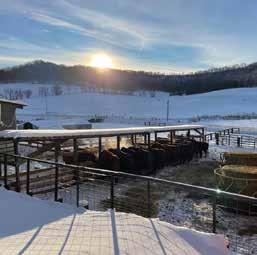
Wisconsin

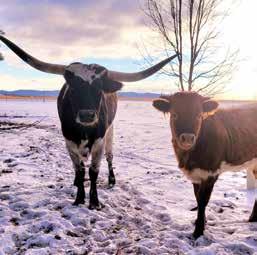


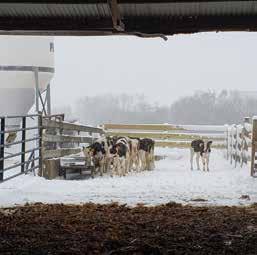
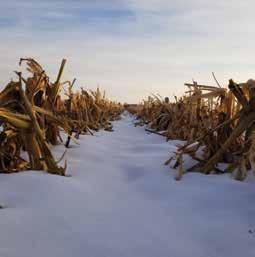
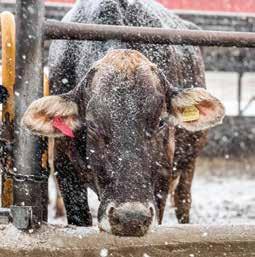

40 WISCONSIN FARM BUREAU FEDERATION Rural Route
Farm Bureau members live and work with beautiful landscapes and livestock. On this page we highlight those sights and special moments. Please email your best photos (high resolution jpgs at 300 dpi) to Lsiekmann@wfbf.com Due to the high volume of photos we receive, we are unable to publish every photo. Photos sent in may be used in other WFBF publications. WINTER WONDERLAND
Kyle Nilsestuen, Arcadia
Britney Leege, Wisconsin Dells
Audrey Pfaff, Durand
Becca Hilby, Hazel Green
Andrea Brossard, Burnett
Krista Dolan, Dodgeville
Leslie Reinke, Elkhorn
Amy Esch, Dodgeville
Emma Huber, Wisconsin Dells
Waushara County Educator Named Award Winner

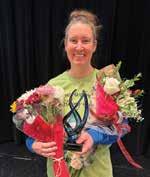

Jessica Rettler has been named the 2022 Wisconsin Agriculture in the Classroom Outstanding Educator. Rettler is a fourth-grade educator at Tri-County Elementary School in Plainfield. The Outstanding Educator Award honors K-12 educators who work to enhance student learning and achievement in core subjects while increasing student awareness and understanding of the important role agriculture plays in students’ daily lives.
“I believe human survival and sustainability rely upon agricultural literacy,” Jessica stated in her application. “The basic needs of air, food, water and protection from environmental dangers sustain life. Agriculture is key to those basic needs. By increasing the level of any form of literacy, we empower others to make good choices.”
For the past 21 years, Rettler has integrated agricultural literacy into her classroom by staying current on past and present agricultural practices, as well as sharing personal experiences and values from her family farm. Casual conversations and well-planned lessons are a part of her daily teaching. Rettler has integrated agriculture into almost every core subject allowing her students to improve their reading, writing and problem-solving skills through partnerships with Wisconsin Agriculture in the Classroom, Adopt-A-Cow classroom program and Hancock Agricultural Research Station.
While being a farmer and a teacher are not required to bring agriculture to the classroom, it has certainly helped Jessica’s efforts. Her family’s farm has provided produce for the school’s lunch program which has sparked conversations and young minds alike about how food is produced and the farmers who are raising and growing it.
“I can’t think of a better way to spend my life than teaching, farming and inspiring others to be healthy, happy, helpful and good stewards of the land. We are what we eat: mind, body, and soul,” said Rettler.
Rettler received a plaque and prize package valued at more than $1,700 and will represent Wisconsin as the state’s nominee for the Excellence in Teaching About Agriculture Award Program presented by the U.S. Department of Agriculture’s Ag in the Classroom program. The national winners will be announced at the National Agriculture in the Classroom Conference in Orlando in June.
The Excellence in Teaching about Agriculture Award program is sponsored by the Wisconsin Farm Bureau Foundation and supported by the National Agriculture in the Classroom program.

41 wfbf.com AG IN THE
CLASSROOM
Jessica Rettler, 2022
Wisconsin Agriculture in the Classroom Outstanding Educator.
Rettler shows off produce from her farm that was served as part of the lunch at Tri-County Schools.
Rettler works with community partners to provide on-farm, hands-on learning opportunities for the entire school.
Rettler has received Ag in the Classroom grants to grow student awareness and understanding of the impact has on her student’s lives and the community.
What’s on Tap –Maple Syrup!
It may feel like winter yet, but around Wisconsin, maple syrup producers are getting ready to put more than 920,000 taps into trees that will garner nearly 1.2 million gallons of maple sap. The warm days and cool nights of late winter create the right conditions to wake maple syrup trees from their winter dormancy. When a maple tree’s sapwood temperature rises above 32 degrees, it creates a positive pressure within the wood, causing the sap flow. The sap will be collected, cooked and bottled as we head into spring.
Did you know?
• Maple syrup does not freeze.
• The color and flavor of maple syrup changes according to the outside changing temperatures.

• It takes 40 gallons of maple sap to make one gallon of maple syrup.
• In 2021, Wisconsin produced approximately 440,000 gallons of maple syrup or enough to fill 150 concrete trucks.
• Maple syrup is only produced in the northeastern United States and eastern Canada, the region in which sugar maple was found.
National Ag Day Turns 50!
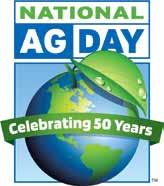
Since 1973, the Agriculture Council of America has been dedicated to connecting consumers with the farmers and industries that provide food and fiber products. The mission of the organization is help grow awareness and understanding of where and how food and fiber is produced. Why is celebrating agriculture important? If you are reading this, you probably already appreciate the amazing opportunities created by agriculture – a safe, abundant food supply, exciting career opportunities, and a purposeful life are just a few reasons to celebrate agriculture. Now more than ever, we have an obligation to increase agricultural literacy in our country. With less than 2% of the general population working in production agriculture, consumers’ personal connections with agriculture are waning. We can change this story line, if we all take a few moments and begin to share our careers, community impact and basic information about modern agriculture. Not sure where to start? Check out these ideas or visit agday.org for how-to guides, educational resources, and social media kits. Mark your calendar for March 21, 2023, and get ready to celebrate National Ag Day 2023.
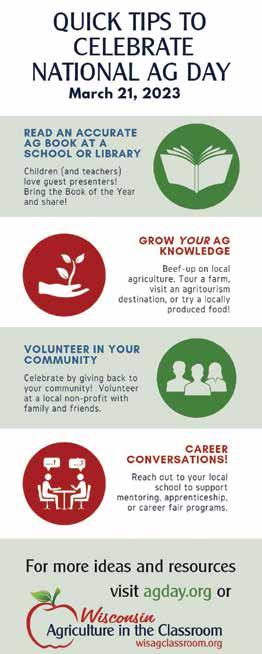
42 WISCONSIN FARM BUREAU FEDERATION Rural Route AG IN THE CLASSROOM
Fun facts courtesy of National Agriculture in the Classroom –Pancakes! Lesson,Wisconsin Extension Maple Syrup Program and PBS.org.
Gift Brings New Professional Development to Educators
ompeer Financial has awarded $15,000 to Wisconsin Agriculture in the Classroom to support a new educator professional development program.
Ag in the Classroom is partnering with Nourish the Future, a nonprofit science educator program, to offer Wisconsin middle school and high school science educators a two-day immersive training in how to teach science using agriculture concepts. The focus of the training will be on integrating agriculture topics including water quality, soil/cover crops and renewable energy, into existing science curriculum. Educators will participate in hands-on labs, farm tours and network with agriculture leaders. Participants will also receive curriculum, materials and training to implement concepts into their curriculum. Compeer’s sponsorship will offset costs of training, resources, hotel rooms, meals and facility fees to help make this learning experience
Cfeasible for Wisconsin science educators.
This sponsorship will also allow Ag in the Classroom to bring a sampler workshop to the 2023 Wisconsin Society of Science Teachers conference in Madison on March 9-11 to recruit for the July Nourish the Future educator development program.
Compeer Financial has been a sustaining partner of Ag in the Classroom for many years. This new commitment to agriculture literacy will allow the program to grow awareness and understanding among educators in a course of study that all Wisconsin students are required to take science. Ag in the Classroom is excited to share this new opportunity and continue to thank sponsors like Compeer Financial that allow programming to grow and innovate to support educators in classrooms across the state.
Learn more about Compeer Financial’s grant opportunities by visiting compeer.com/investing-in-rural-communities/givingback/grants.

Expedition Agriculture with Alice in Dairyland
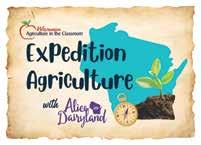
The Wisconsin Department of Agriculture, Trade and Consumer Protection’s Alice in Dairyland program is partnering with Wisconsin Farm Bureau’s Ag in the Classroom program to promote specialty crops in classrooms across the state. Utilizing a Specialty Crop Block Grant from the U.S. Department of Agriculture, the partnership is shining a light on the diversity of the many crops and products of Wisconsin agriculture. The Expedition Agriculture lesson will take fourth grade students on a journey across Wisconsin through a presentation that explores each region’s unique agriculture industry and its role in the state’s history, economy and communities. The presentation includes an overview of Wisconsin agriculture and
concludes with a fast-paced, fun game that will introduce students to 13 of Wisconsin’s biggest agriculture products. Classrooms will receive additional activity materials to support a hands-on exploration of five additional agriculture products. Schools interested in participating or more information should visit aliceindairyland.com/ expedition-agriculture. Presentations are limited to 100 students, but multiple presentations at the same school may be requested. Presentations will be accommodated based on the availability of Alice in Dairyland. Lessons and resources have been developed by Wisconsin Ag in the Classroom to enhance the impact of Alice in Dairyland’s school visits. Resources will be made available to educators and volunteers on the Wisconsin Ag in the Classroom website, wisagclassroom.org.
Thank You Foundation About
to the Following WFB Foundation Donors: (Donations were made between Dec. 1, 2022, and Jan. 19, 2023)
• Carl Casper
• Pearl Mary Goetsch
• Dick Rens
• Dave Kruschke
• Sally Schoenike
the
The Wisconsin Farm Bureau Foundation was established in 1988 to provide support for agricultural education and leadership programs. Through donations and other contributions, the foundation invests time and resources to support the next generation of agriculturists.

43 wfbf.com FEBRUARY | MARCH 2023
• Eugene & Willie Witter Trust
• Chris Retzlaff in honor of John Goode’s Retirement
• Ryan & Cheri Klussendorf in memory of George Blomberg
• Dan & Julie Merk in memory of Francene Church
• Winnebago County Farm Bureau in memory of Andy Ballard
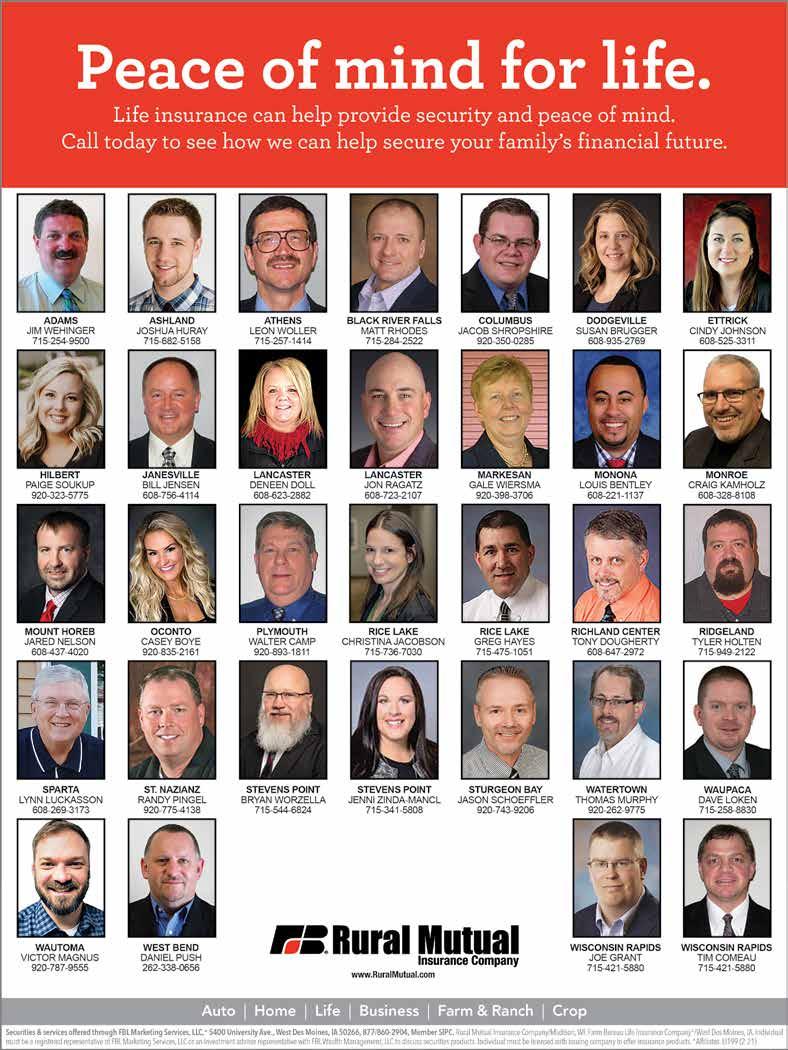
How to Inspect Your Home After a Winter Storm
Wisconsin winters can be unpredictable — from blustering winds to below freezing temps to heavy snowfalls.
During this time of year, it is extremely important for homeowners to be mindful of the potential dangers caused by snow, ice, wind and other natural elements.
In the event of a winter storm, here are a few ways to make sure your home stays protected.
Check Your Home’s Exterior
Rather than risking personal injury, it is best to hire a roofing contractor to inspect your roof after a winter storm. Professionals have the necessary training and equipment to stay safe while working at high elevations and unstable surfaces.
A roofing contractor can examine your home for loose or missing shingles, check seals around skylights and chimneys, remove any snow buildup or ice dams, and check downspouts or drain blockages from gutters.
Removing snow from your roof can help prevent roof collapse and the build-up of ice dams. Taking preventative measures can help reduce damage from occurring and minimize repair costs. Entryways, including doors and windows, must also be carefully inspected for damage.
• Impaired windows and doors cause drafts, which not only result in discomfort from cold air seeping in but also jeopardize your home’s energy efficiency.
• It’s important to check the seals and caulking for damage to ensure there is no water leakage as this can lead to interior condensation and mold growth.
In storm cases with high winds, check to make sure there are no areas of loose, bulging or missing siding as this could leave your home exposed to the winter elements and be an opportunity for water to seep in. If you don’t have siding, check for peeling paint, which, if left untreated, could potentially lead to wood rot.
Protect Your Pipes
Especially during the coldest season of the year, make sure your home’s piping system is in good condition. If a snowstorm is on the radar, your first step should be to prevent pipes from freezing or bursting. This can be done by running a trickle of water from your faucets, opening interior doors and keeping your garage door closed. Also, always keep your home’s internal temperature at least 55 degrees.
Document Any Damage for Claims

If your home or belongings sustain damage from a winter storm, log the evidence and document everything immediately with photos or video. Contact your insurance agent and contractors as soon as possible to discuss a recovery plan. Always inspect your home again in the spring and take note of any issues you may have missed that arose because of winter storms.
Making sure our customers and their homes are protected year-round is a top priority for Rural Mutual.
To learn more about how to protect your home this winter, contact your local agent.
How to Deal with Stress on the Farm
It’s inevitable. If you’re involved in farming, you have stress. During these moments when you are feeling overwhelmed, taking time to regroup can make all the difference.
Tips for Managing Farm Stress
Plan Your Day
Each morning, start with a short plan of your day. We know breakdowns happen, people and animals get sick, and the weather doesn’t cooperate; however, building in breaks or chances to stretch your legs, can help minimize the stress you feel throughout the day.
Reduce Accidents by Slowing Down
Don’t rush through your tasks. By putting your attention on the project you’re working on instead of the next item you need to complete, you reduce the risk of accidents and injuries.
Rushing to save yourself five minutes can potentially ruin the rest of your day if you break something or get injured while distracted.
Set Daily Goals
Take time throughout your day to check in with your daily goals. Re-evaluate your needs to set up the most productive schedule for the rest of the day. Run your daily goals past a family member or close friend. No one understands the stress of farming more than them.
Stay Energized
Taking 30 minutes to share a meal with your family can help your body and your mind rest and reset. While it may be difficult to stop for any amount of time, the break can pay back with a clearer mind.
The most important thing to remember when dealing with stress on the farm is that anything can happen at any time. Make sure you have an emergency action plan in place so you and your farm are well-prepared.
45 wfbf.com FEBRUARY | MARCH 2023 RURAL MUTUAL
Preparing for the Cybercrime Risks
As we welcome the new year, many people pause to reflect on the past 12 months and prepare for the year ahead.
That pause and reflection can often help us reset our perspective and prepare for the new year. When it comes to evaluating the evolving risks to our personal information, an end-of-year recap can be useful to prepare for the new risk trends that are on the horizon.
Here are a few highlights from 2022 to examine what threats might be seen in 2023.
Was 2022 as Bad as Expected?
At the beginning of 2022, there were serious concerns about increased levels of cybercrime. After all, the previous year had seen a historic number of data breaches, with roughly 295 million individuals having their data compromised. With that much data being exposed, the question of how that stolen data would be used was obvious.
The pace of breaches in 2022 has been less than that of last year, so the total number of victims for the year has been tracking lower than last year. Still, there were more than 165 million victims impacted by data compromise from January to the end of September.
A single breach also can alter the numbers dramatically. In August, the number of victims increased by 100 million based on only two breaches.
Cyberattacks Cause the Most Data Breaches
Cyberattacks are far and away the biggest cause of data breaches, accounting for 88% of breaches in the third quarter of 2022.

The most common type of cyberattack is phishing — a kind of social engineering attack where criminals send an email pretending to be a trusted person or business to get victims to reveal their personal or payment information. In fact, phishing has been the top method of attack since the start of 2019. The next most common is ransomware.
Based on that breakdown, criminals seem to be focused on tricking people in order to get what they need rather than breaking the cybersecurity defenses that have been put up— which mirrors research from Verizon that showed 82% of breaches originated as the result of a human element, like an employee falling victim to a phishing attempt.
Looking Forward to 2023
Based on the recent trends seen by Sontiq, IdentityForce and
the Interstate Technology and Regulatory Council, there are a few trends we expect in 2023:
• Phishing: As noted, phishing has held the top spot for 15 consecutive quarters because it continues to be incredibly effective. As phishing emails continue to evolve and become more sophisticated, emails will be even more difficult to spot.
• Social Engineering Attacks: The sophistication seen in phishing is also showing up in the other types of social engineering that criminals use. There is an increase in the number of complex, multi-channel scams — where fraudsters are using a combination of emails, texts, phone calls and bogus websites to provide a realistic 'customer experience' as they collect personal data. As a result, 75% of security professionals rank social engineering as the most dangerous threat.
• Relationship Scams: A relationship scam is when a criminal uses a fake online identity to gain a victim’s trust. This can be a romantic or platonic relationship. They build a relationship over time using the cover of a romantic interest or common interests to manipulate or steal from the victim. Last year, the Federal Trade Commission said relationship scams generated a record $547 million in losses.
Preparing for 2023, given those threats, what can be done to reduce the risk of a breach or identity crimes in the coming year?
• Go to the source: If you did not initiate the communication, do not engage. Verify, verify, verify.
• Use unique and complex passwords: Passwords should be 12 characters or longer and unique to each account.
• Enable multifactor authorization: If it’s not mandatory but is offered as a security option, opt in.
• Take your time making decisions: Do not feel pressured to act immediately. Scammers rely on people to act without thinking.
• Talk to someone you trust: If you’re not sure of what to do, ask for help. It could be a knowledgeable friend, relative or co-worker, or you could reach out to the professionals at the Interstate Technology and Regulatory Council.
46 WISCONSIN FARM BUREAU FEDERATION Rural Route RURAL MUTUAL
Connect with Rural Mutual Insurance @RuralMutual @RuralMutual @Rural.Mutual @Rural Mutual Insurance Company www.RuralMutual.com







































































































 A Message from WFBF President Kevin Krentz
A Message from WFBF President Kevin Krentz









 With Kari Schoenike
With Kari Schoenike














































